FAR FROM HOME
attempting to build new lives abroad
When the Taliban walked into the capital of Afghanistan on Aug. 15, 2021, America’s longest war came to an end. The vacuum left by the exit of U.S. troops forced tens of thousands of Afghans to flee. Some were evacuated by Western nations. Others escaped on foot. For many Afghan women, the Taliban takeover spelled the end of the freedoms they had enjoyed for two decades.
One year on, thousands of women are scattered across the world. For this project, a global team of female journalists and photographers spent time with eight individuals who are building new lives, from the beaches of Florida to the suburbs of Dublin.
Starting anew has not been easy. They ache for their homeland and their loved ones, unsure when they will see them again beyond their cell-phone screens. At night, they often return to Afghanistan in their dreams. They are wrestling with new identities, spending their days learning new languages and exchanging their Afghan air force uniforms for restaurant aprons.
Read More: What Afghanistan’s Women Stand to Lose
In a country where nearly two-thirds of the population is under 25 years old, members of Afghanistan’s young generation particularly flourished during the U.S. and NATO’s war against the Taliban, which had ruled the country in the late 1990s before being ousted by U.S.-backed Afghan forces in 2001. The international community encouraged women to chase their dreams, be emboldened by the end of the repressive rule many of those same women had known as children.
When the final U.S. troops withdrew in a chaotic exit last summer, Afghan women saw their hard-won gains evaporate overnight. Despite promising to honor women’s rights “within Islam,” the Taliban has intensified its crackdowns-—just as Afghan activists had long warned.
The Taliban has banned high school for girls, placed restrictions on women working and traveling abroad, and ordered that women stay at home—and that, if they must go out, they cover their entire body and face except for their eyes. The regime has closed almost all shelters for women fleeing violence, and domestic violence is now sharply on the rise. It disbanded the ministry for women’s affairs and suppressed women’s demonstrations. The number of child marriages is surging, and women are increasingly committing suicide.
The Afghan women who managed to get out are the lucky ones, but they feel betrayed by a world that promised to stand by them. They mourn the loss of freedoms that reverberates across their nation and several generations.
These are women who once were full of optimism about the future of their country. They joined Afghanistan’s security forces, or became educators, artists, and activists. Now they are free and safe. But they are also far from the homes they love, and the futures they deserve.
—Amie Ferris-Rotman and Zahra Joya
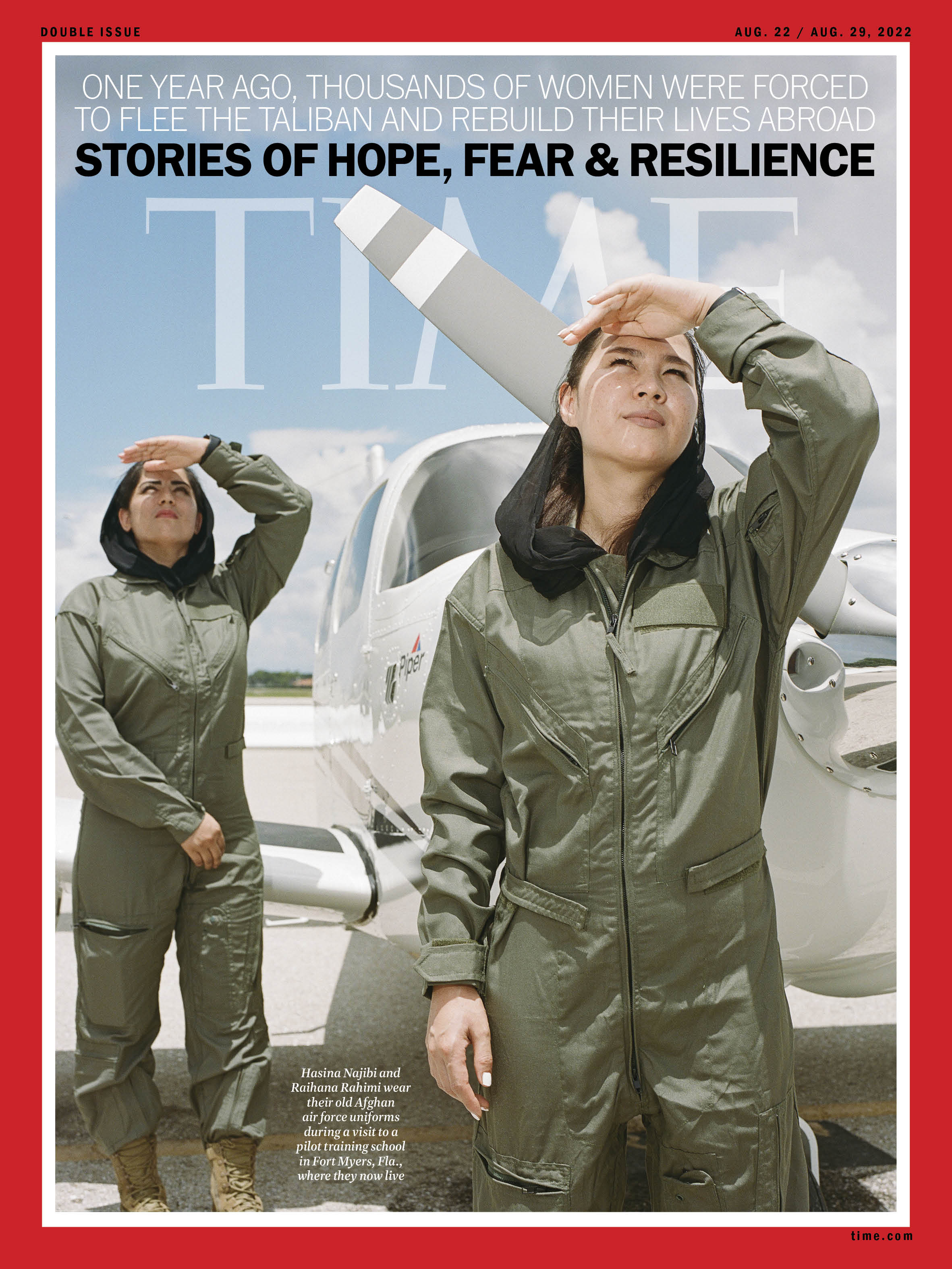
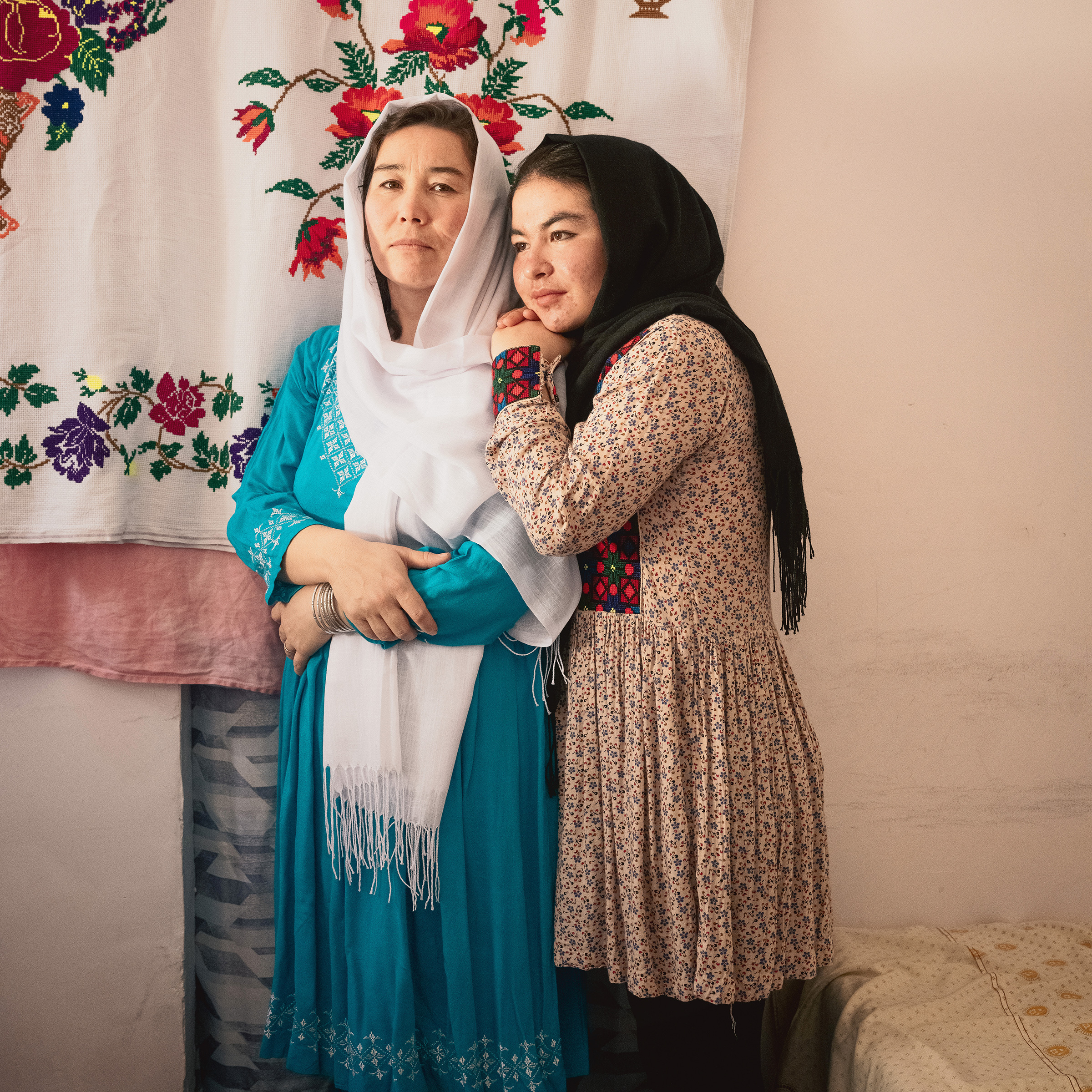
Najiba Ebrahimi
São Paulo
Photographs by Luisa Dörr for TIME
Biology teacher Najiba Ebrahimi and her daughter, Azada, in São Paulo, Brazil, on July 10, 2022
Najiba Ebrahimi
São Paulo
Photographs by Luisa Dörr for TIME
Najiba Ebrahimi lives in Freedom. It’s the São Paulo neighborhood where the 33-year-old has settled and what she feels she’s finally attained after escaping the Taliban. A champion for the rights of women and girls in the minority Hazara community, Ebrahimi taught biology at a girls’ school in Afghanistan’s southeastern Ghazni province and shared her love of sports with her students. That turned her into a target when the extremist group made its return.
In late August, she began receiving phone calls from various men using different numbers. “They said, ‘You shouldn’t be alive. If you stay here, you’ll die,’” Ebrahimi says.
So she fled. Her parents had left Afghanistan years earlier for Brazil because of ethnic persecution. She crossed the mountains of Pakistan with her teenage daughter, brother, and cousin, the women under the cover of burqas. Her parents got to work on getting them visas.
Now Ebrahimi works in São Paulo with her family at their Afghan restaurant, Koh-I-Baba, named for the mountains of her ethnic Hazara homeland. It’s a new start and also a return to what she loves most: life with her family and the freedom to be herself.
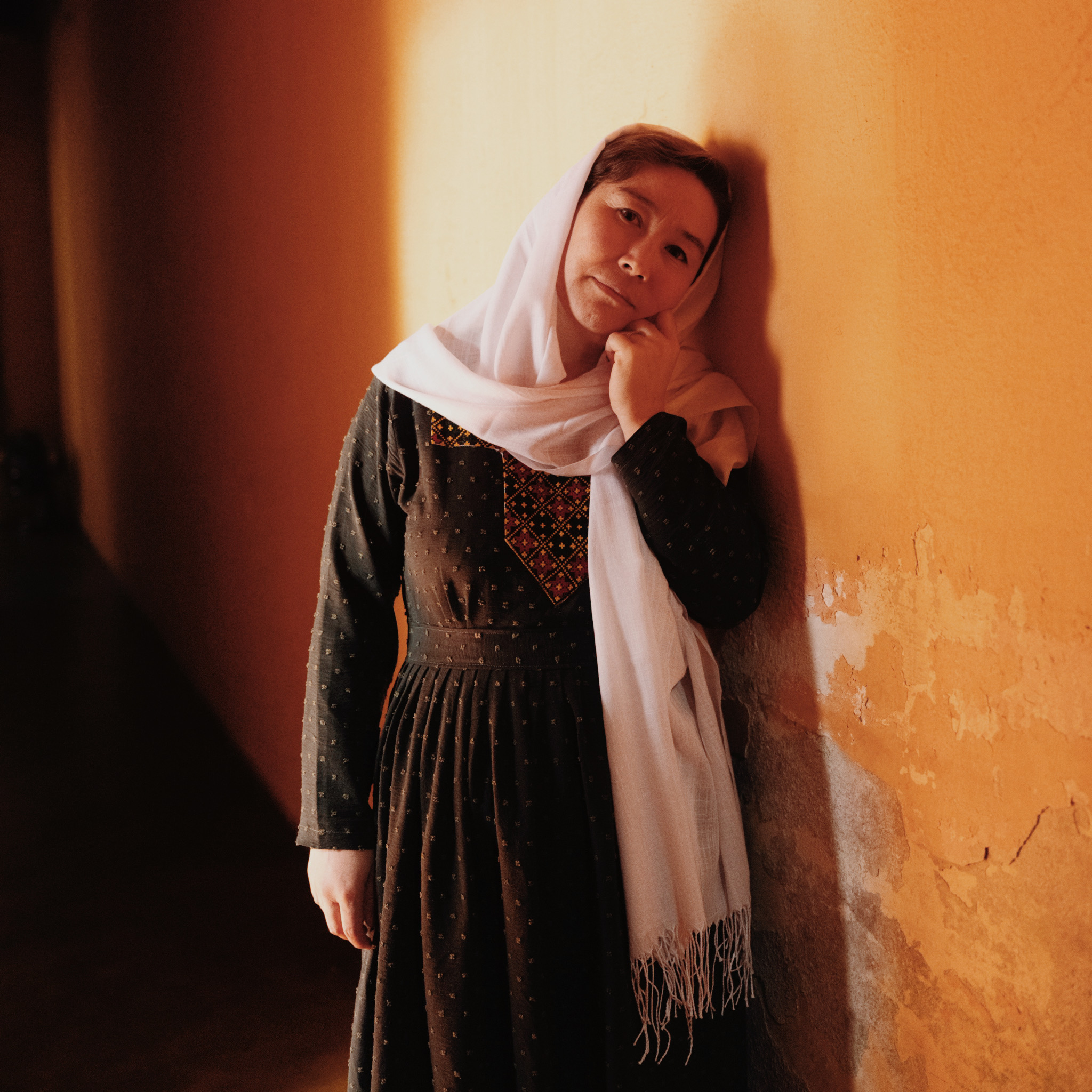
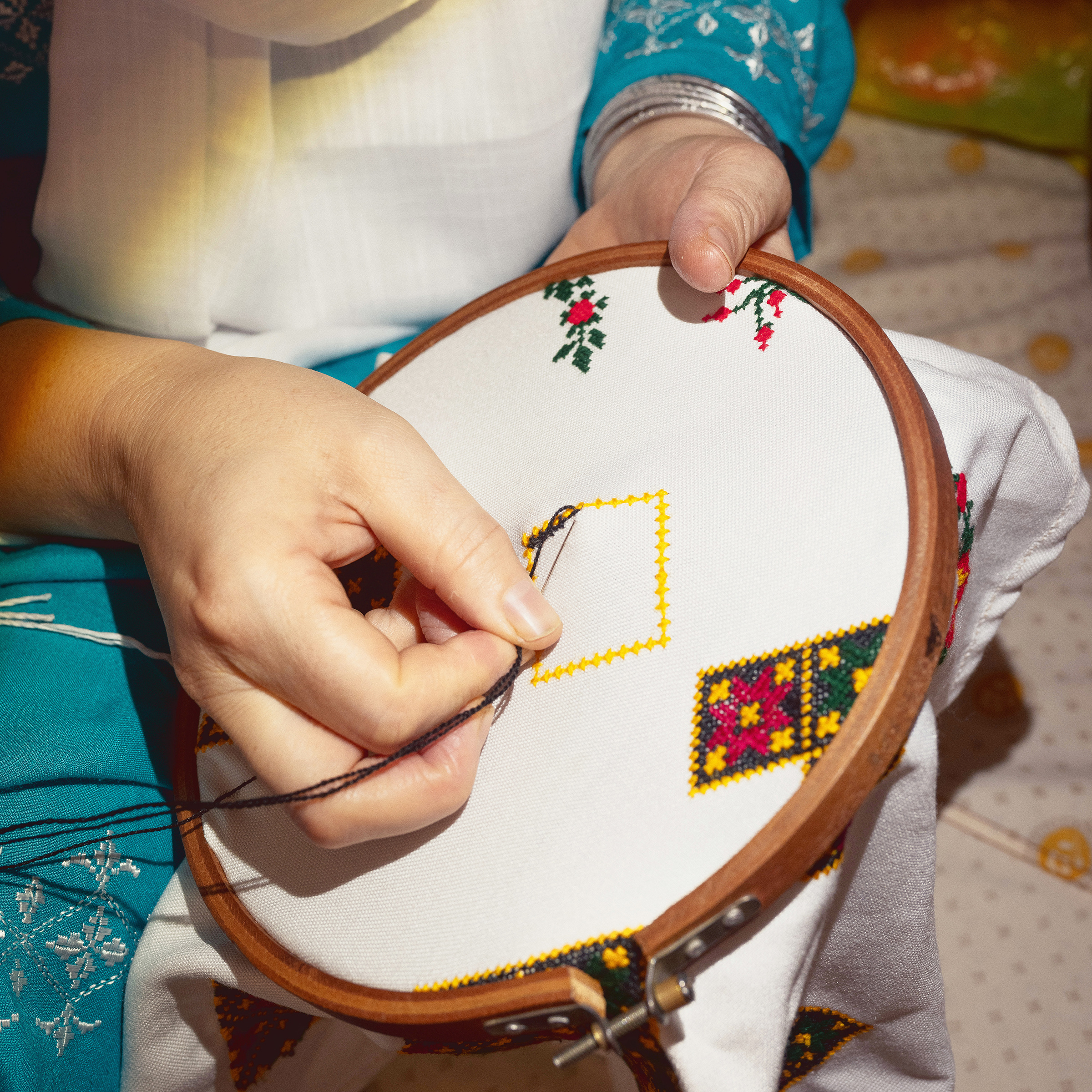
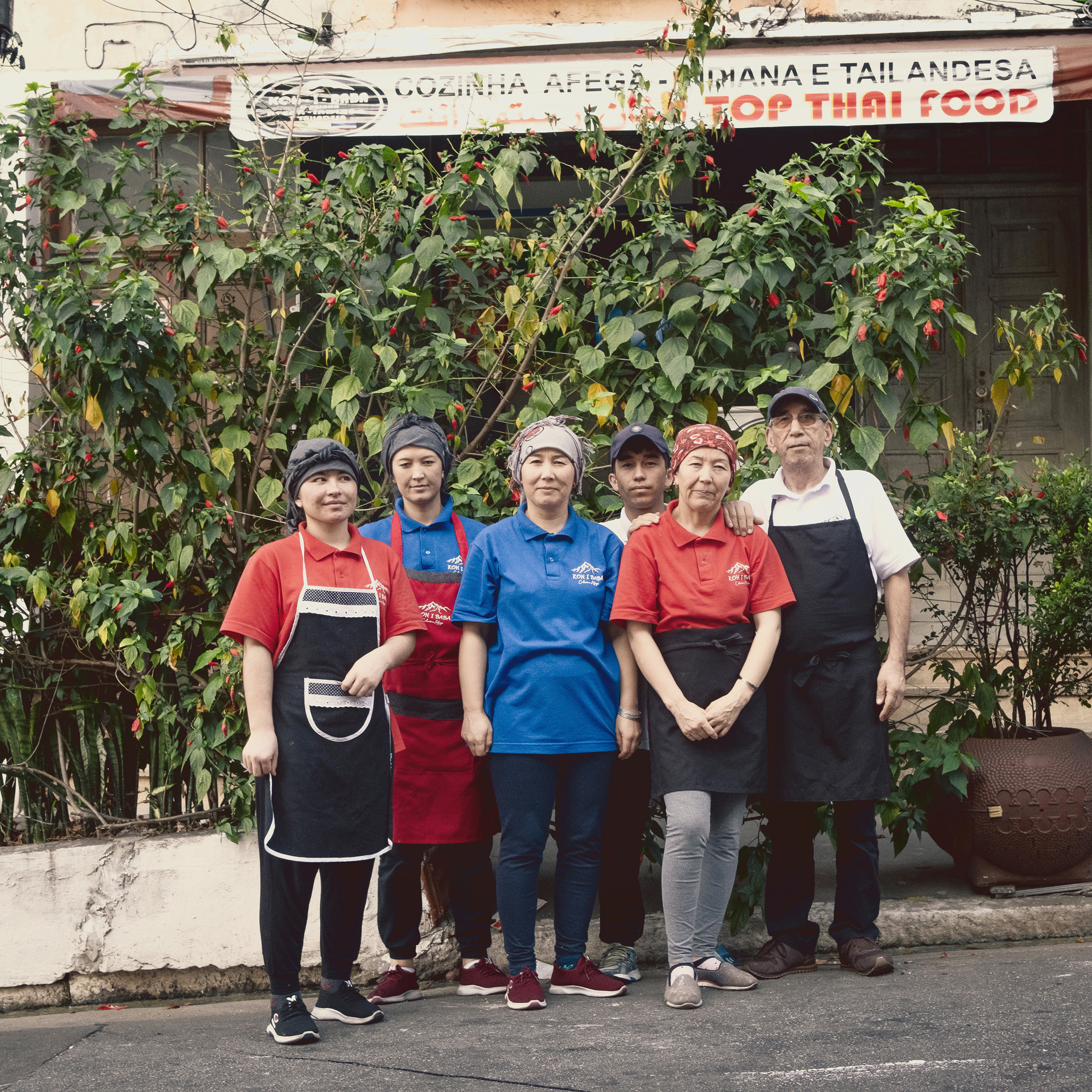
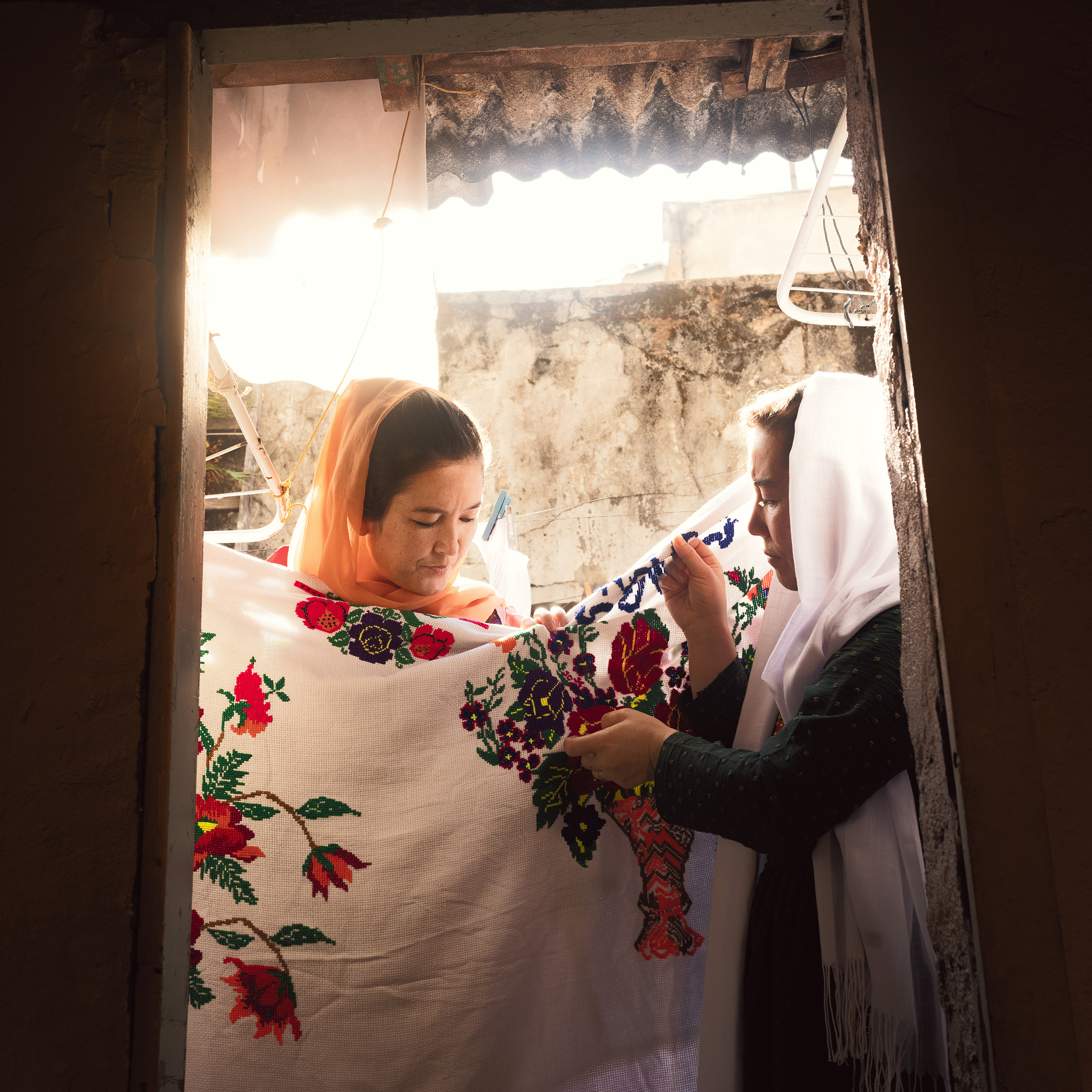
What do you miss most about Afghanistan?
My students. I was the first teacher to get them involved in sports. I bought the school’s first volleyball, and we set up tournaments. I even helped train some of the girls who wanted to go to the Olympics.
What has surprised you about your new home?
Women here have freedom. They can wear what they want, do what they want. They don’t have to be afraid. Here I can walk down the street, around my neighborhood, and it’s safe.
What new foods do you eat now?
Food here has a lot of pork and cheese, so it’s hard to find new things I like. But I do like fries.
What is your most treasured possession?
I wasn’t able to bring much with me when I left, but I brought a tapestry I embroidered, which is two meters long. It took me a year to finish it. My mother taught me how to embroider. It’s something that’s passed down through all the women in our families.
What word do you associate with the Taliban?
Fascism.
Choose one word to describe yourself.
Free. That’s how I am here. I can’t go back to Afghanistan. There’s no life there for women.
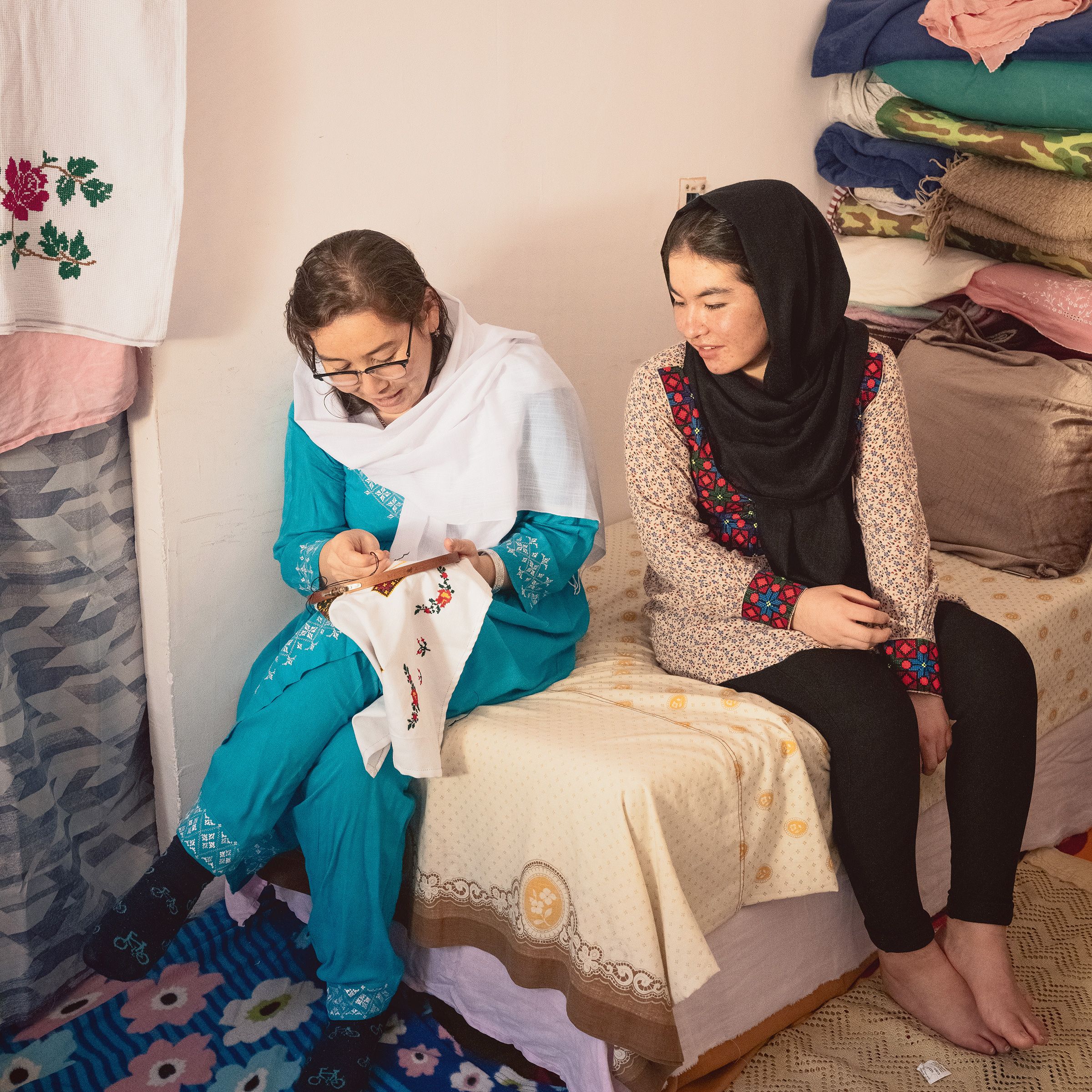
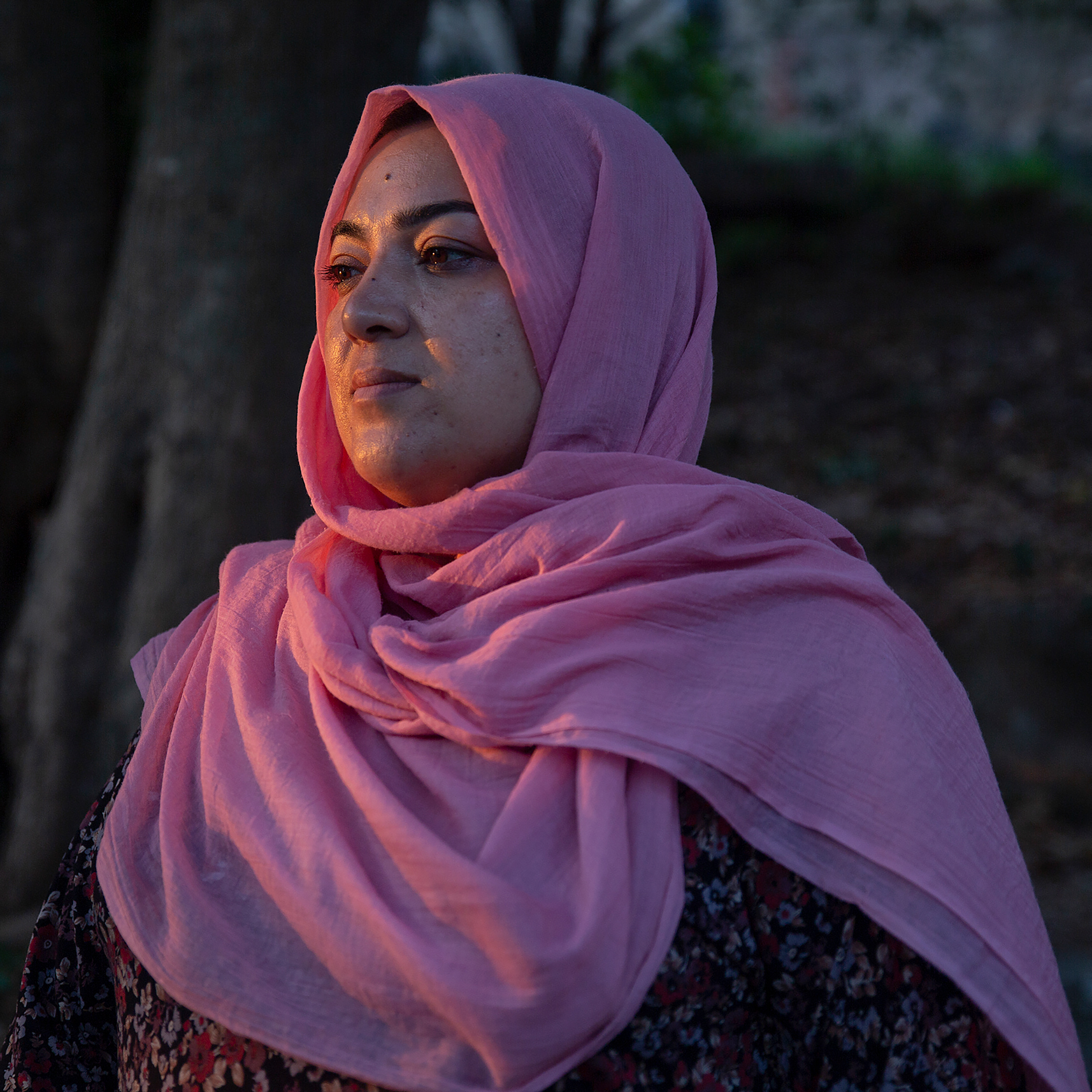
Batool Haidari
Rome
Photographs by Fatimah Hossaini for TIME
Batool Haidari gazes out at the sunset by her house in Rome on July 19, 2022
Batool Haidari
Rome
Photographs by Fatimah Hossaini for TIME
In the days following the fall of Kabul, Batool Haidari found herself forced to make an agonizing decision. Haidari, a 36-year-old psychologist and sex therapist working with women and the LGBTQI community, had safely escaped to Iran where her three children were already hiding, but her Ph.D. research remained in Kandahar, which had been under Taliban control since Aug. 12. Haidari’s thesis was her proudest achievement—the product of years of study. She decided to travel back to collect it.
She got it, then stayed on to organize protests in Kabul against a regime more violent than she’d imagined. Eventually, she had to flee again, this time to Pakistan. There, an Italian journalist helped the family to fly to Italy, where they claimed asylum.
From Rome, Haidari works tirelessly to find escape routes for others at risk, especially women activists and trans people; she also provides phone therapy to those experiencing depression. During rare moments of quiet, she opens her folders of research. For as long as the Taliban oppresses her people, her work feels more important than rest.
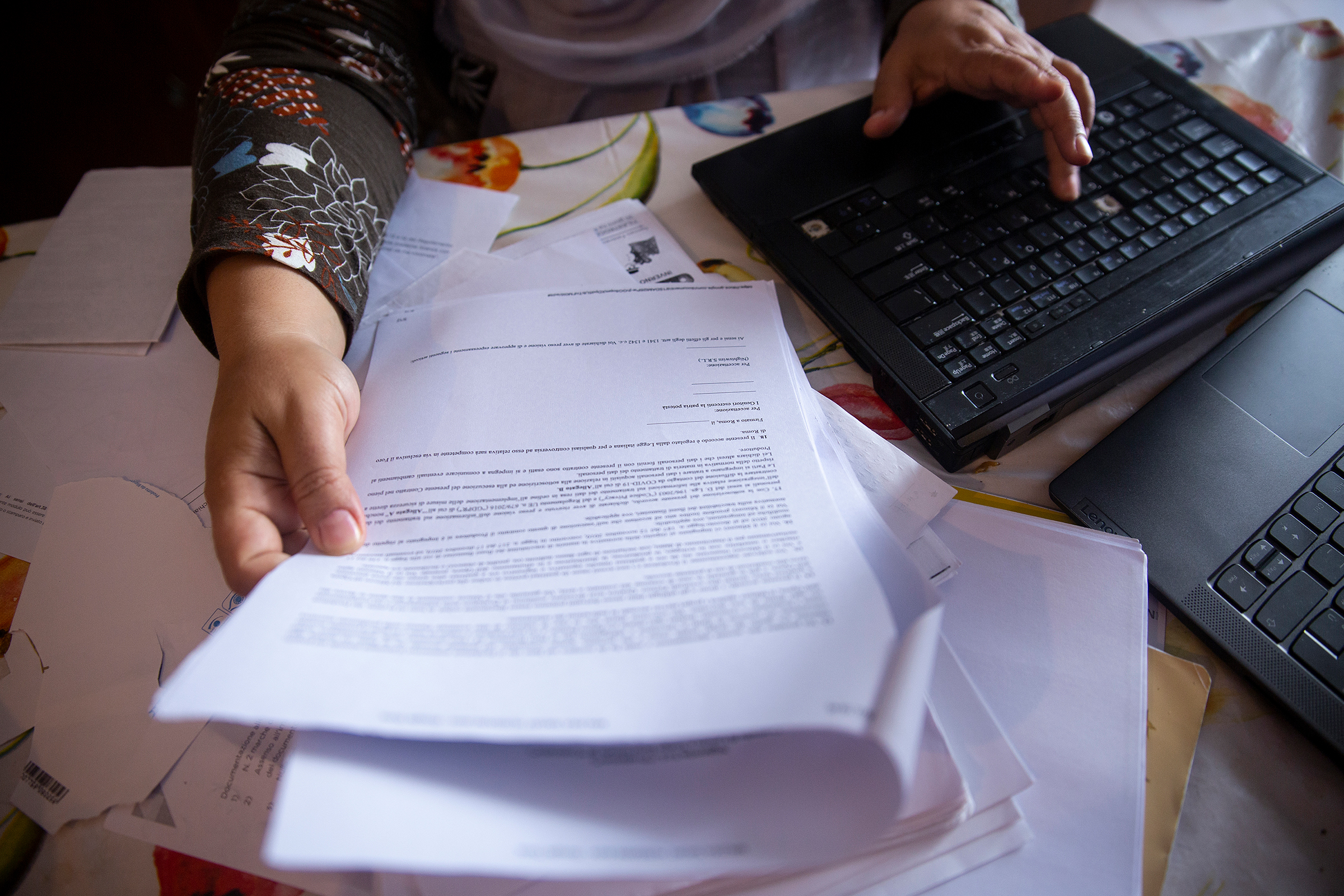
What do you miss most about Afghanistan?
In Kabul, there is a very crowded area where the streets are always full of people selling fruit and vegetables. I miss the sound of them shouting their prices into the air, a hundred times over. They are the sounds of my home.
What has surprised you about your new home?
I was born into a very religious family, in a very religious society. But I never imagined that Italy would be so religious too. There are churches everywhere!
What do you do to relax?
As long as there are women activists trapped in Afghanistan, I cannot relax. At the moment, I spend all my time listening to their problems. When they are free, I will also need to see a psychologist. We will have to empty our minds by talking, dancing, listening to music, laughing… By doing all this, you can find yourself again.
What is the most important thing you brought with you?
My daughters. They are the new generation of Afghanistan. They are powerful girls and they carry all of my hopes for the future.
Choose one word to describe yourself.
I am a warrior. We are all warriors. Not because we are at war, but because we are fighting to survive. Even now, after leaving Afghanistan under such difficult conditions, we are still fighting to live our lives.
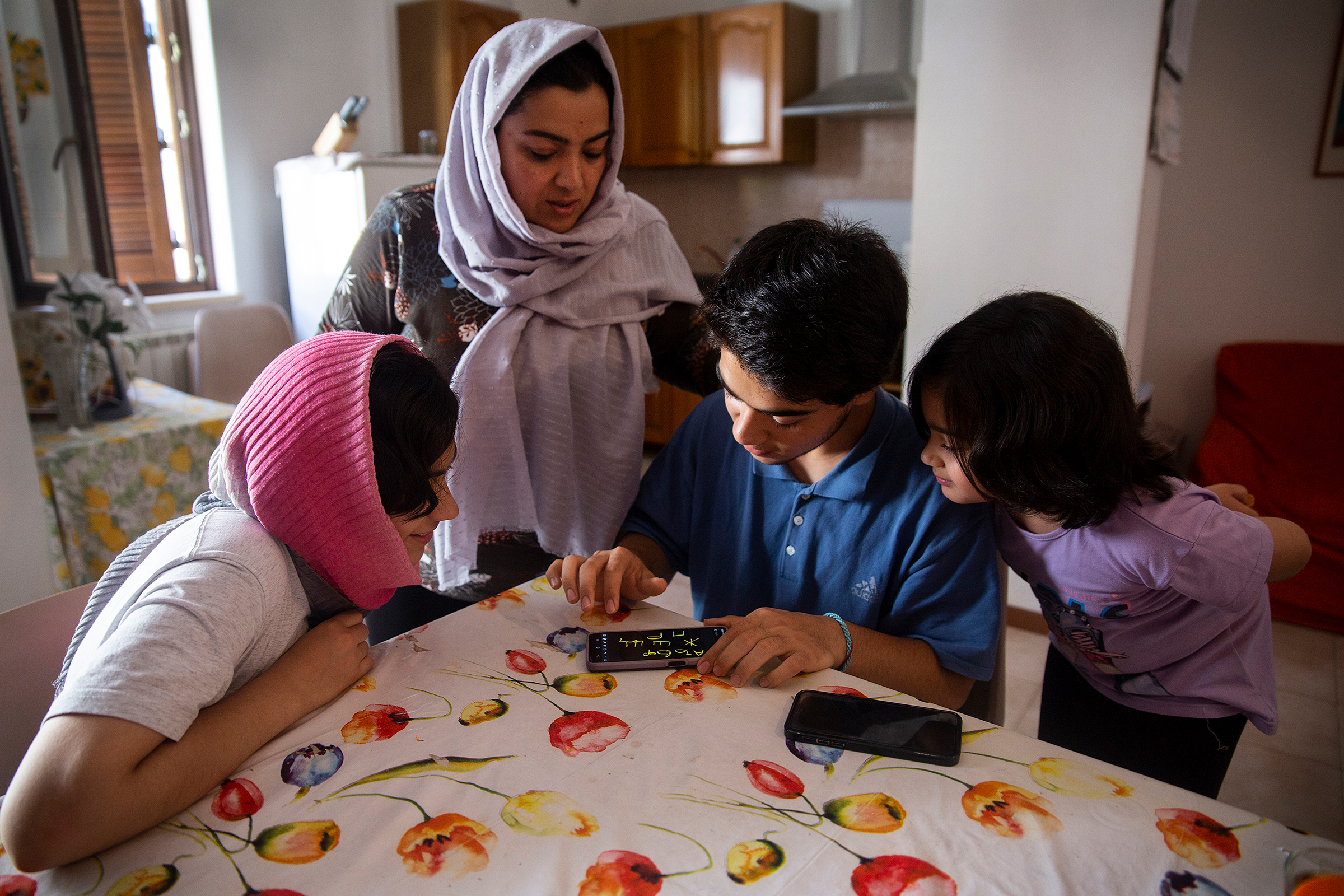
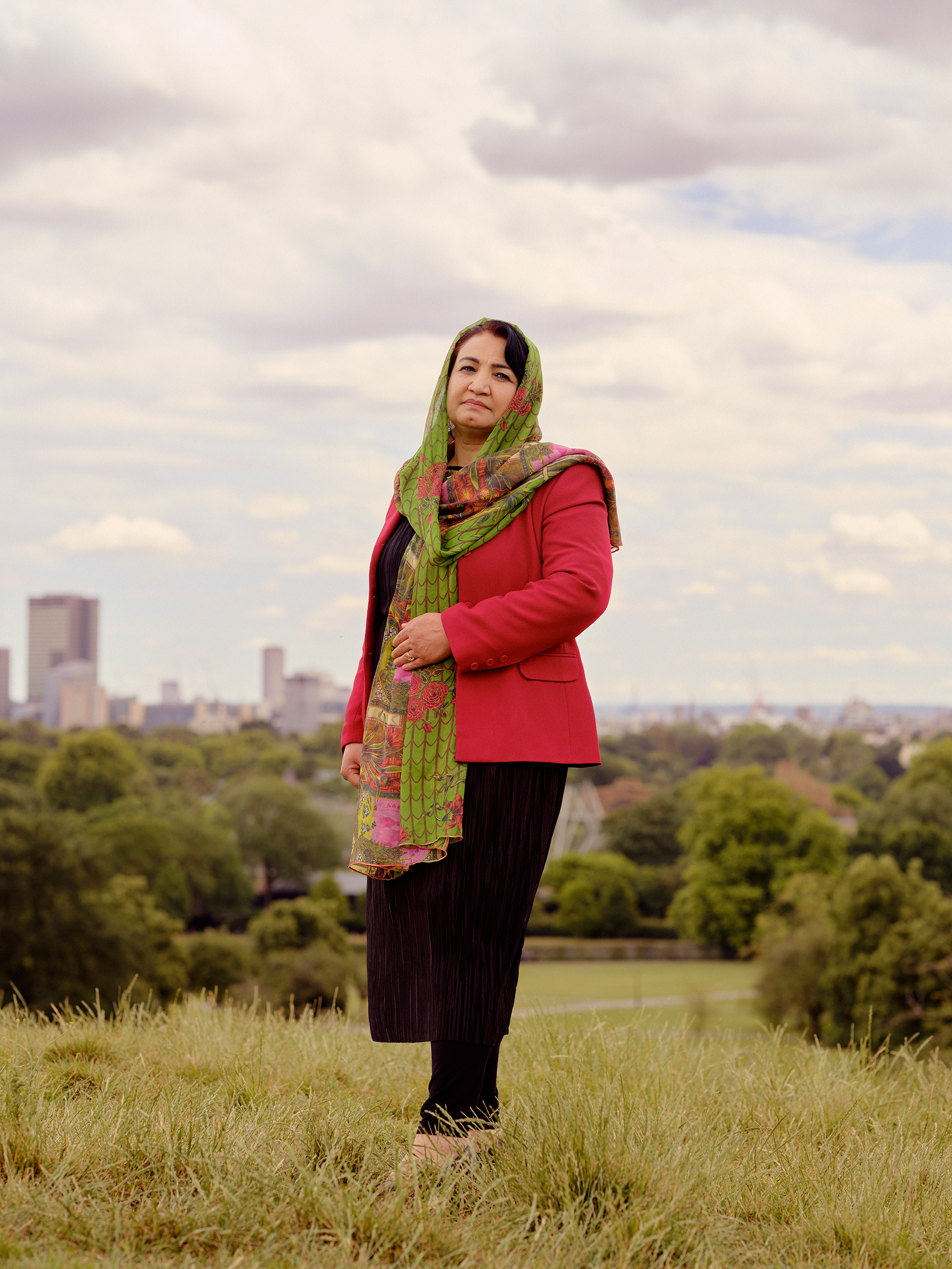
Sahra Alizai
London
Photographs by Kristina Varaksina for TIME
Sahra Alizai stands in the park in Primrose Hill, London, on July 2, 2022
Sahra Alizai
London
Photographs by Kristina Varaksina for TIME
Sahra Alizai has spent half of her life teaching. For 25 years, she taught more than 3,000 men and women to become schoolteachers at the prestigious Kabul Education University. Now, far from her native Kabul, in the boxy London hotel room she shares with her husband, she has become the student.
Alizai once took great delight in watching her students graduate and become teachers themselves, showing a new generation of girls how to read, write, and learn Afghan history and literature. She knows firsthand what a country can look like without education for all. During the civil war of the early 1990s, insecurity and violence pushed girls and women out of school; in the harsh Taliban rule that followed, their education was outright banned. “A country without schools for girls will simply die,” Alizai says.
Today, the education instructor often feels lost in the British capital; each night, she dreams she is back in her classroom at the whiteboard. Her salvation is learning. On weekdays, the 50-year-old takes a bus across London to Paddington, where she studies English. She hopes it will only be a matter of time before she is on the other side of the room, back to teaching others.
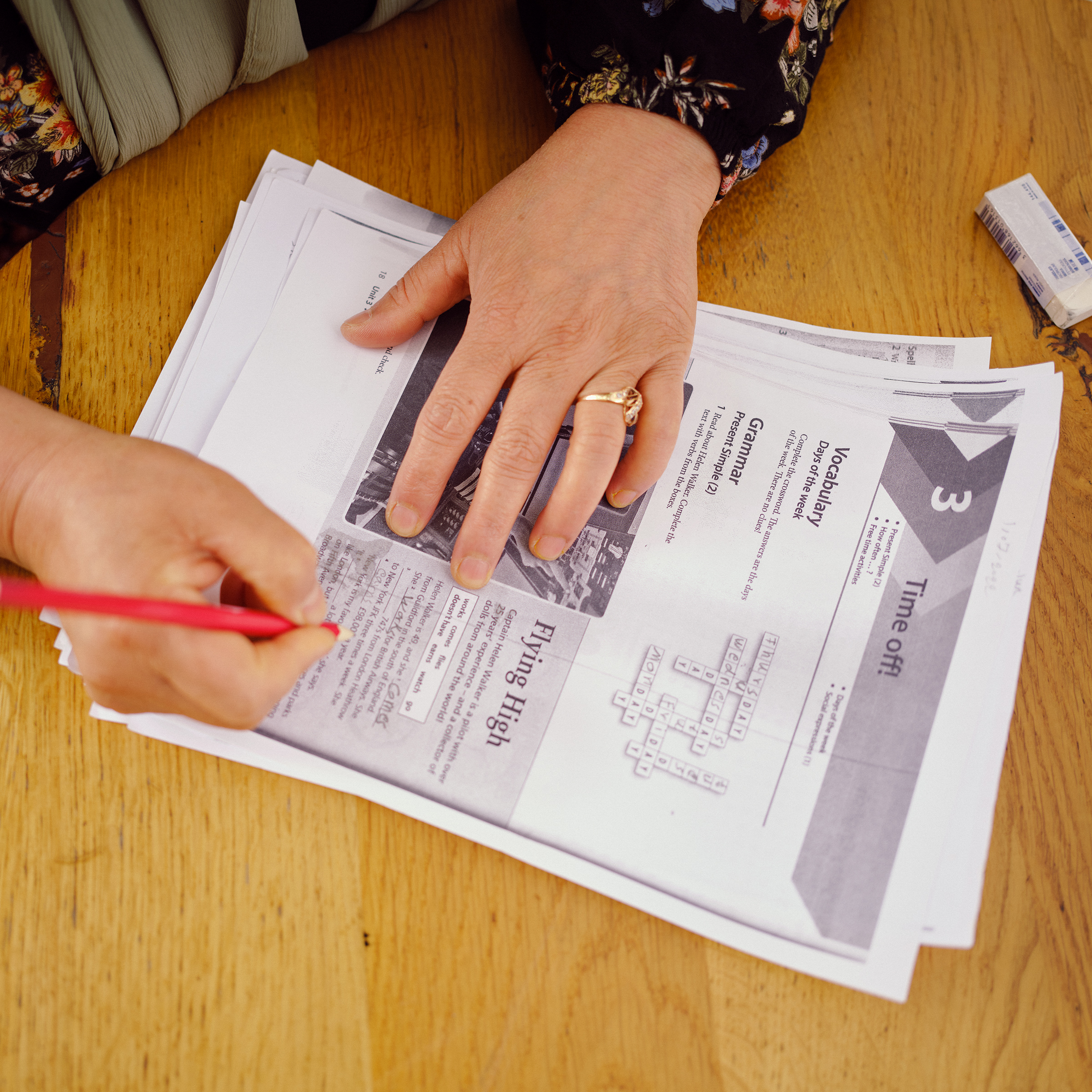
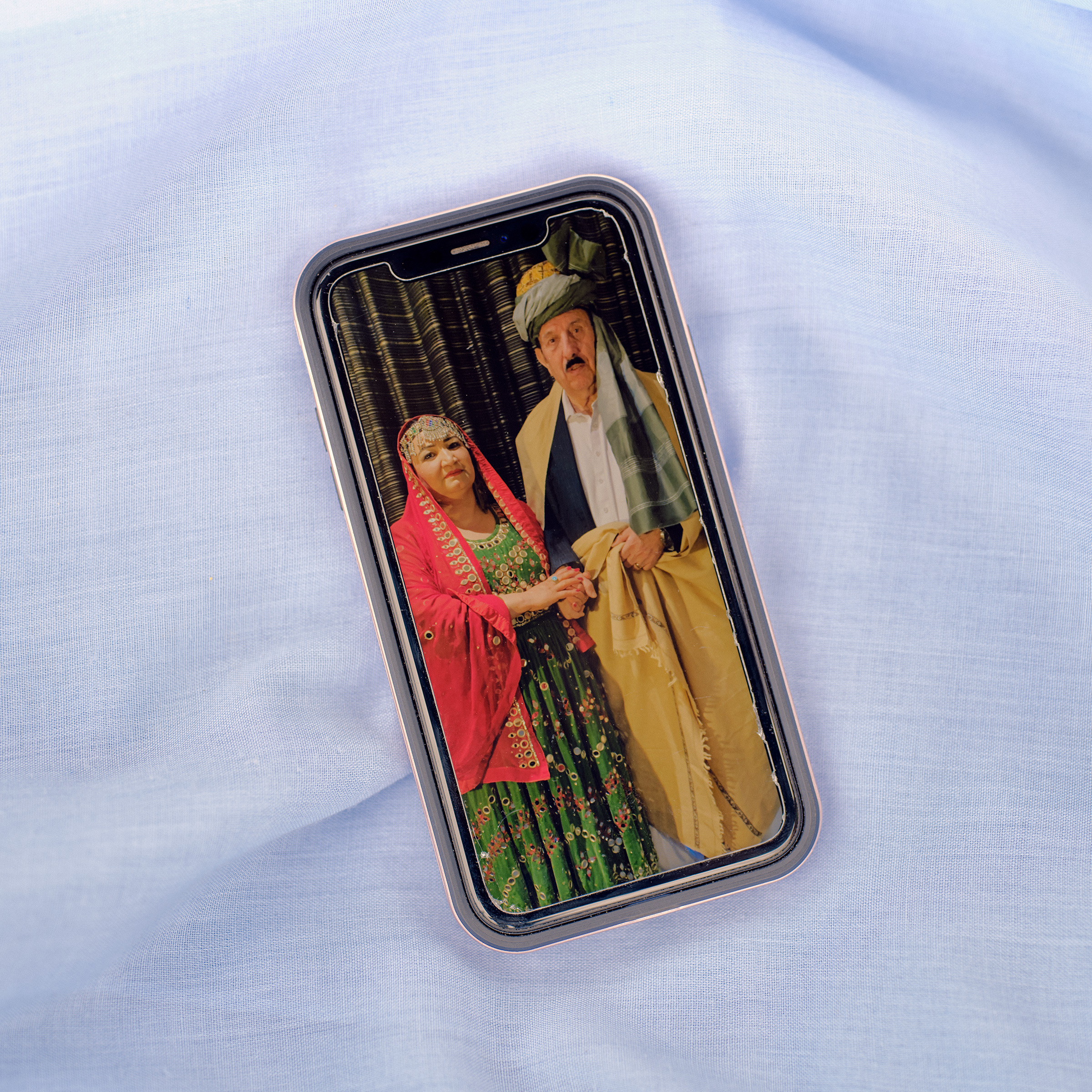
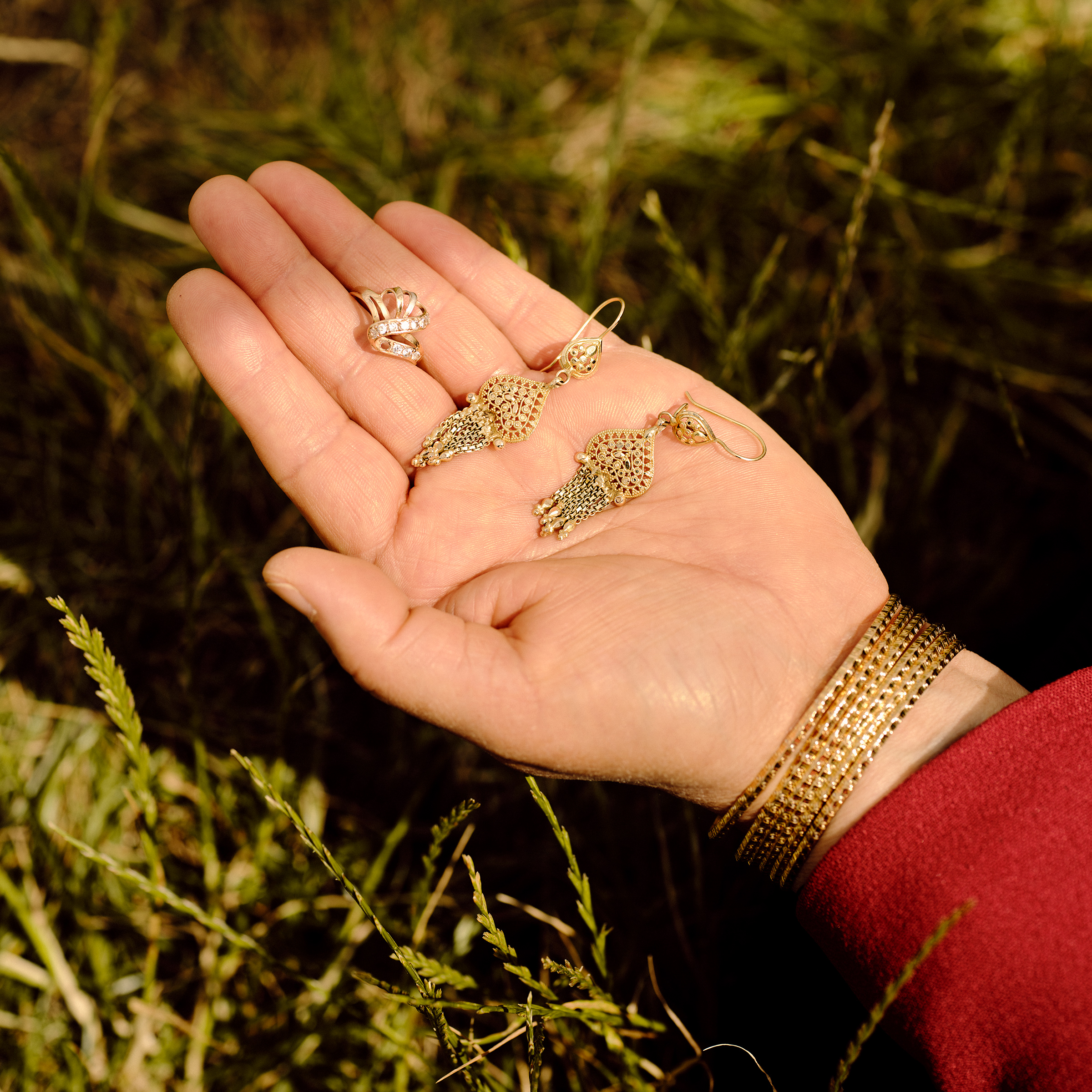
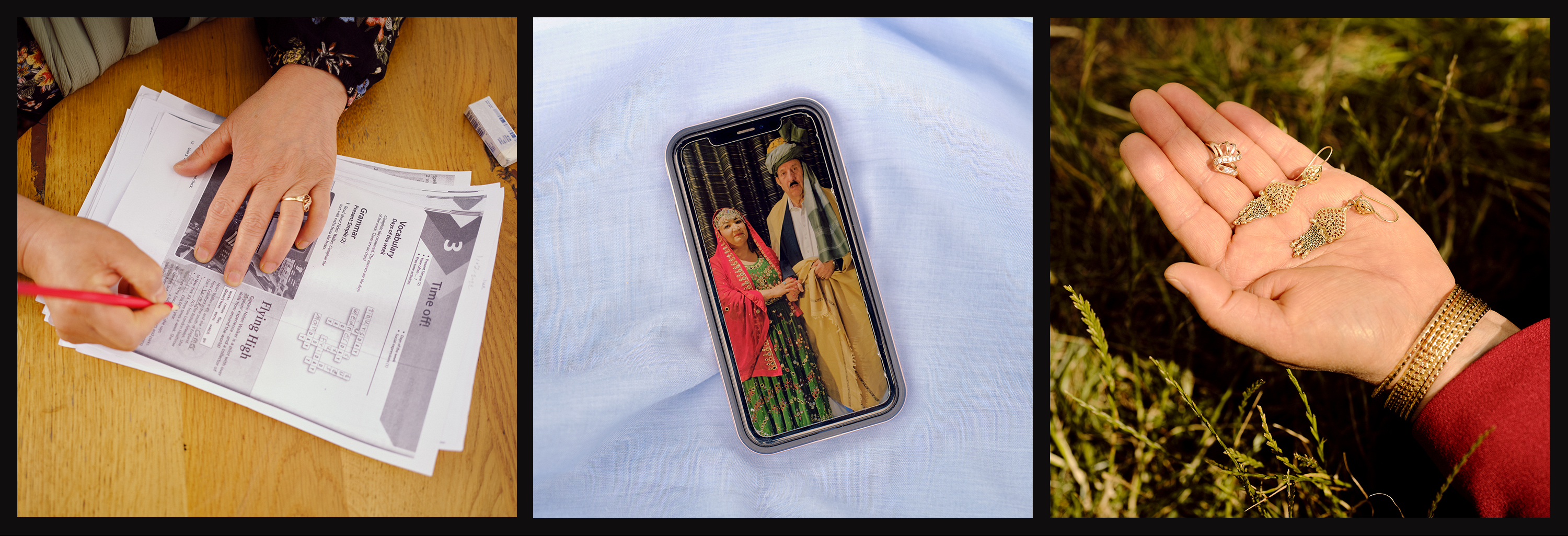
What has surprised you about where you live now?
The government here accepts people from different backgrounds and beliefs. Everyone seems to love each other.
What do you do to relax?
I do my English-language homework. It’s a way of keeping my dignity. I am also keeping a diary of my experiences. So far I’ve written over 20 pages about our journey from Afghanistan to England.
When you think of Afghanistan’s future, what comes to mind?
If the Taliban continue to rule the way they do now, and deny girls’ education and women’s participation in society, Afghanistan will die. No government has recognized the Taliban as legitimate, so the situation will remain terrible. Afghanistan has become an island.
What do you miss most about Afghanistan?
I miss teaching at my university. The university was everything for me. Every night I dream of being back in my classroom at the university, and not in this hotel room in London.
What’s the most treasured possession you have with you?
My earrings and my bangles, which are a gift from my late mother. I also brought with me my cell phone, which has my memories, and my only photos of Afghanistan.
What food from home do you eat most often?
Afghan vegetables, like green beans and sabzi [stewed spinach]. I do not like the food in England, especially pasta. And I will not try those small beans in a red sauce. Awful!
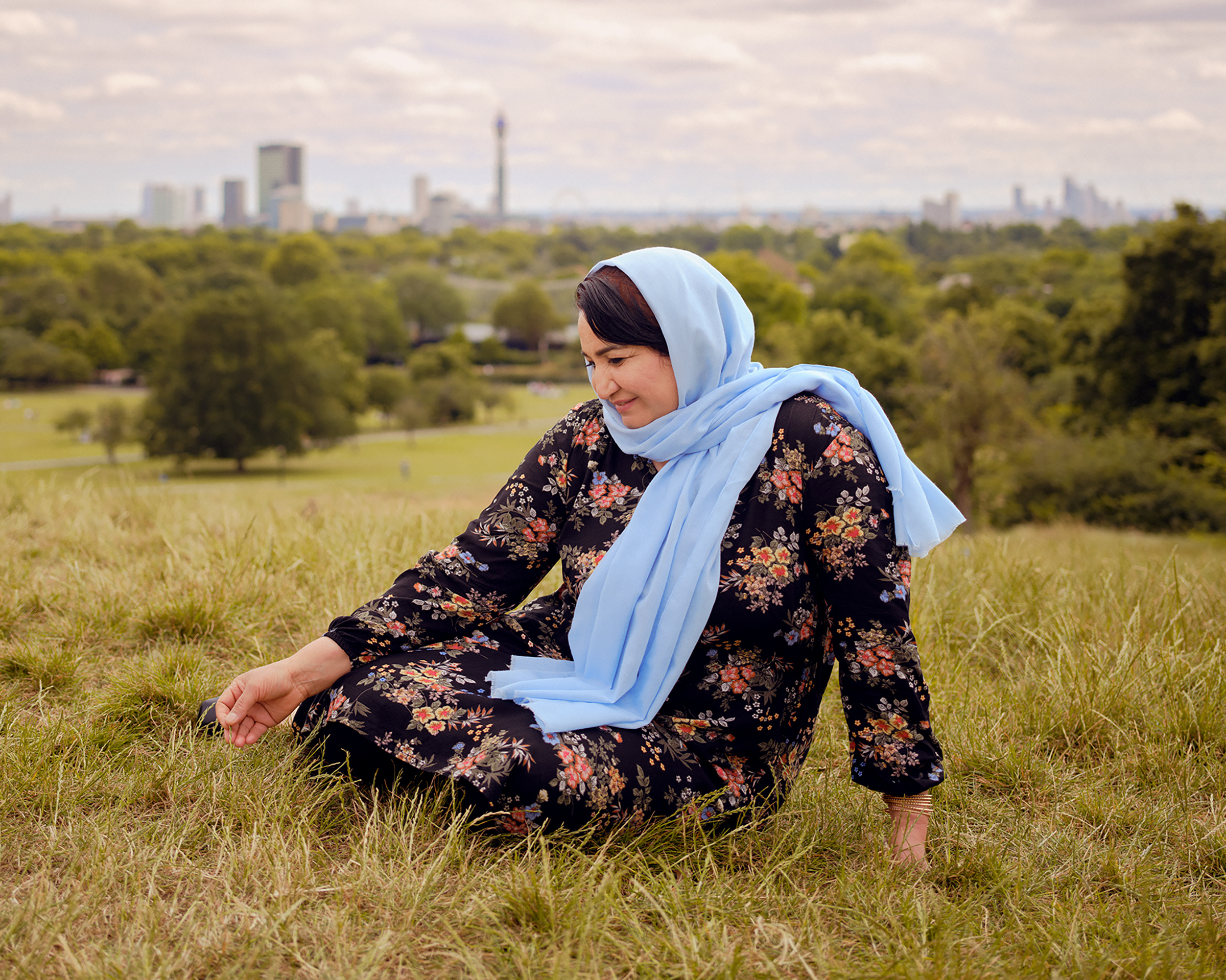
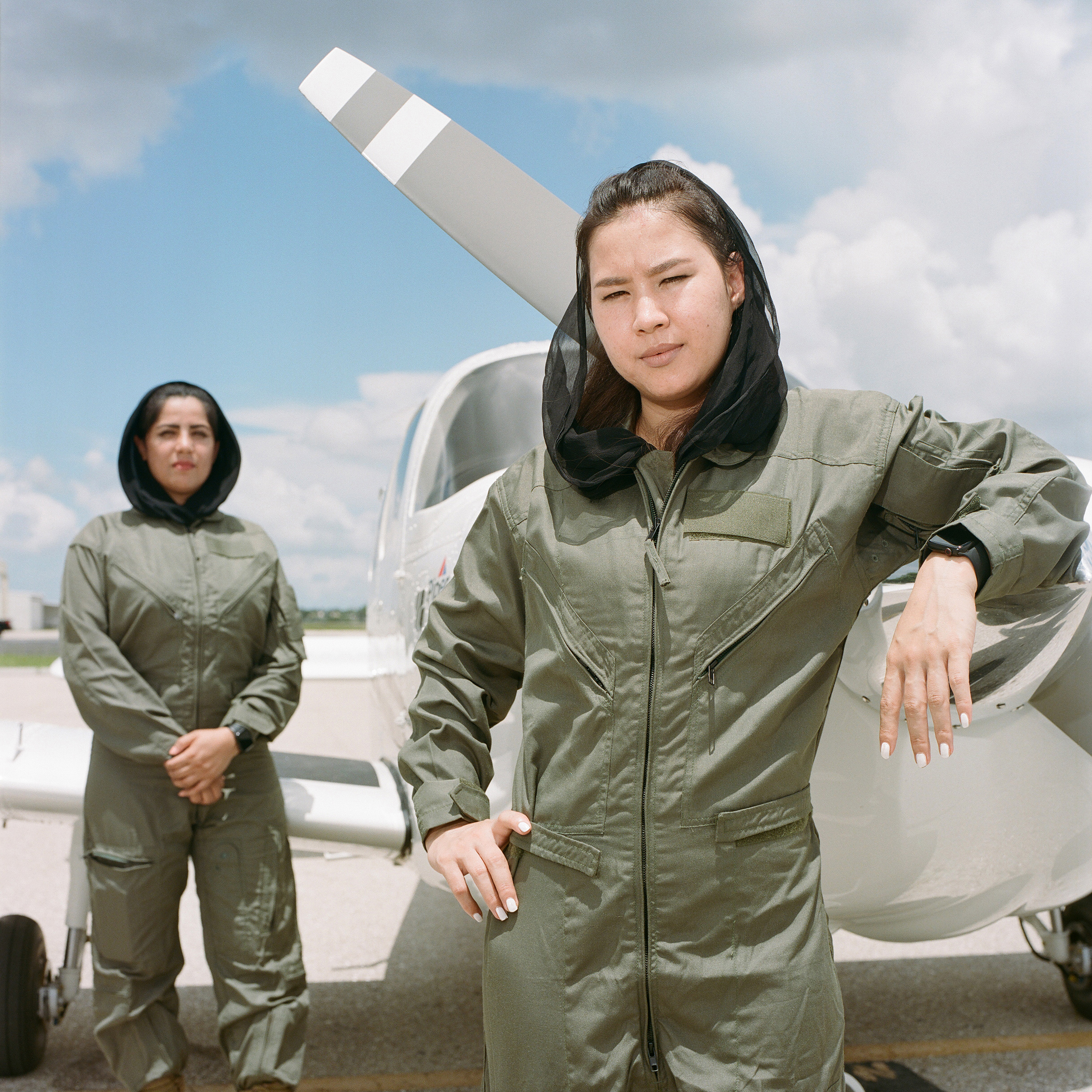
Hasina Najibi & Raihana Rahimi
Fort Myers, Fla.
Photographs by Sabiha Çimen—Magnum Photos for TIME
Hasina Najibi (left) and Raihana Rahimi (right) wear their old Afghan Air Force uniforms while visiting the Paragon pilot training school in Fort Myers, Fla., on July 6, 2022
Hasina Najibi & Raihana Rahimi
Fort Myers, Fla.
Photographs by Sabiha Çimen—Magnum Photos for TIME
Afghan Air Force pilots Hasina Najibi and Raihana Rahimi met last year when they attended an aviation training in Dubai. The two women, who are both 25, immediately clicked and became close friends.
They shared a passion for flying, and both had to fight to earn that right. Najibi, an ethnic Pashtun, would go to work disguised in large sunglasses, worried her relatives and neighbors would discover she was a pilot. Rahimi often faced discrimination in the armed forces for belonging to the Hazara community.
They were preparing to return from Dubai when the Taliban captured Kabul. Worried that the Taliban would take revenge on their families if they were discovered, they told their families to burn the uniforms they’d left at home, as well as their pilot IDs and diplomas. Najibi watched on a video call as her mother set her uniform alight. “All my dreams were on fire,” she says, “and I was just watching.”
Now, living together in the heat of southern Florida, the women wait tables in a strip mall. In the evenings, they put a rug under the tree near their apartment. They drink green tea and talk about their lives back in Afghanistan—and their biggest dream: to return to the skies.
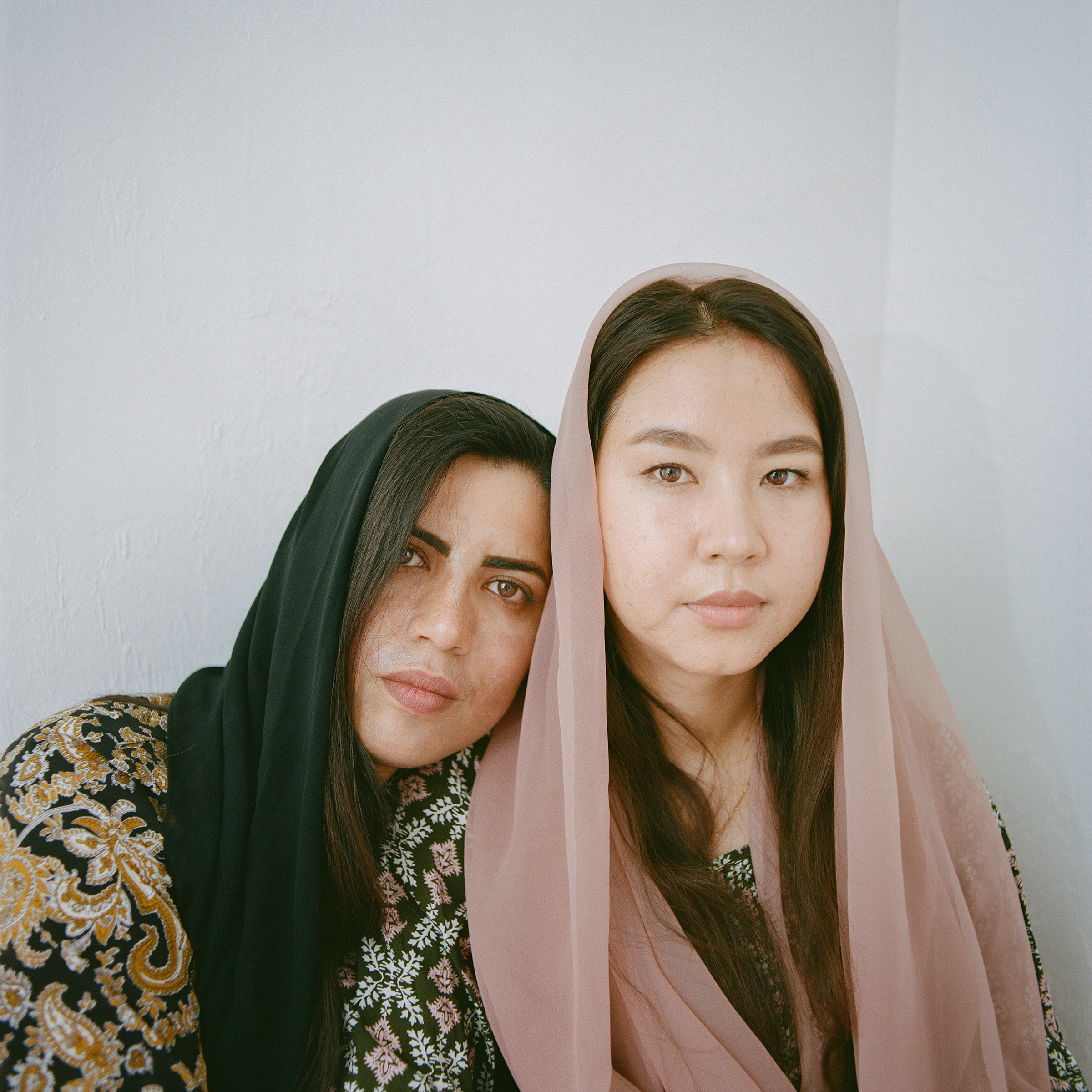
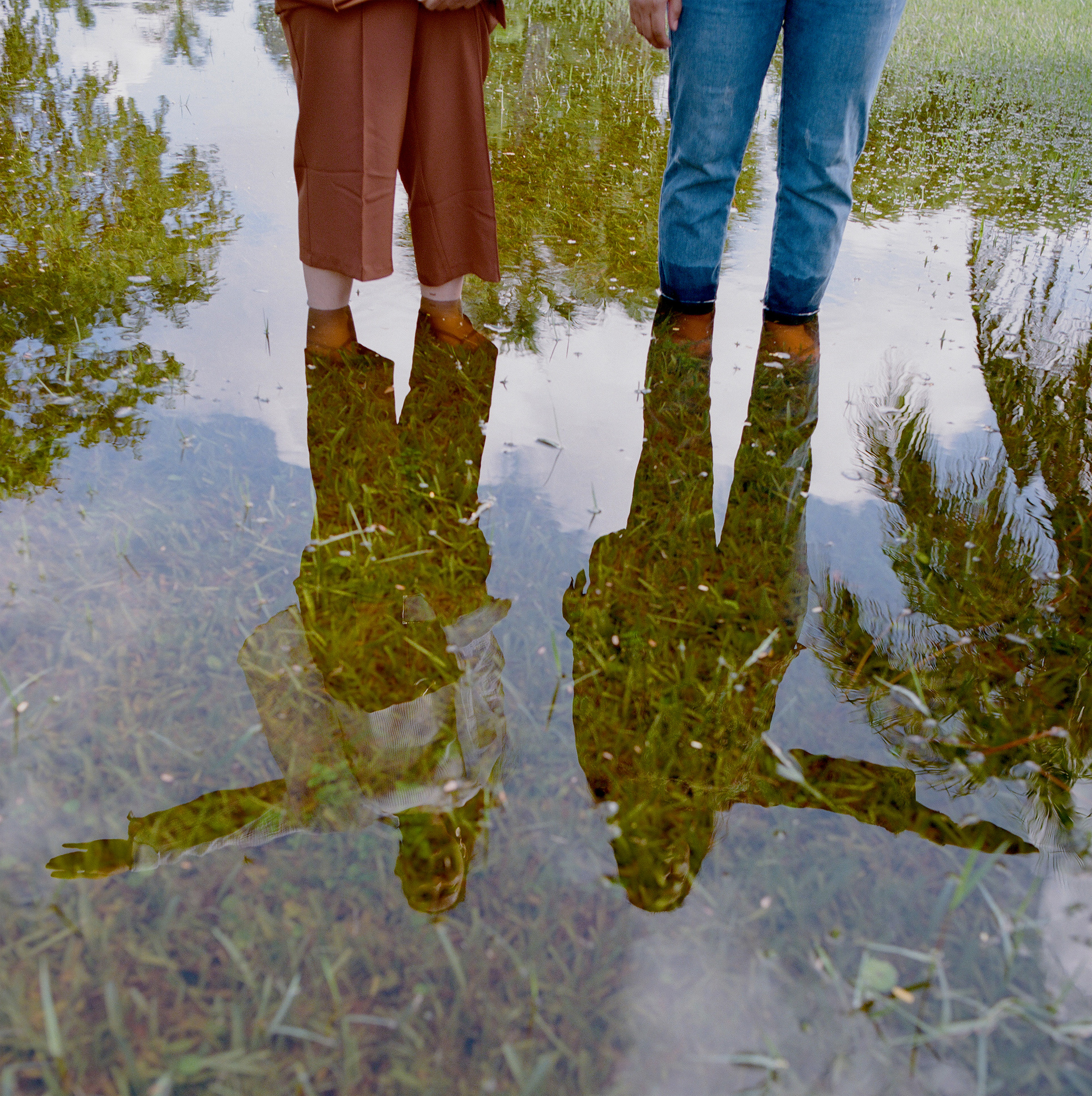
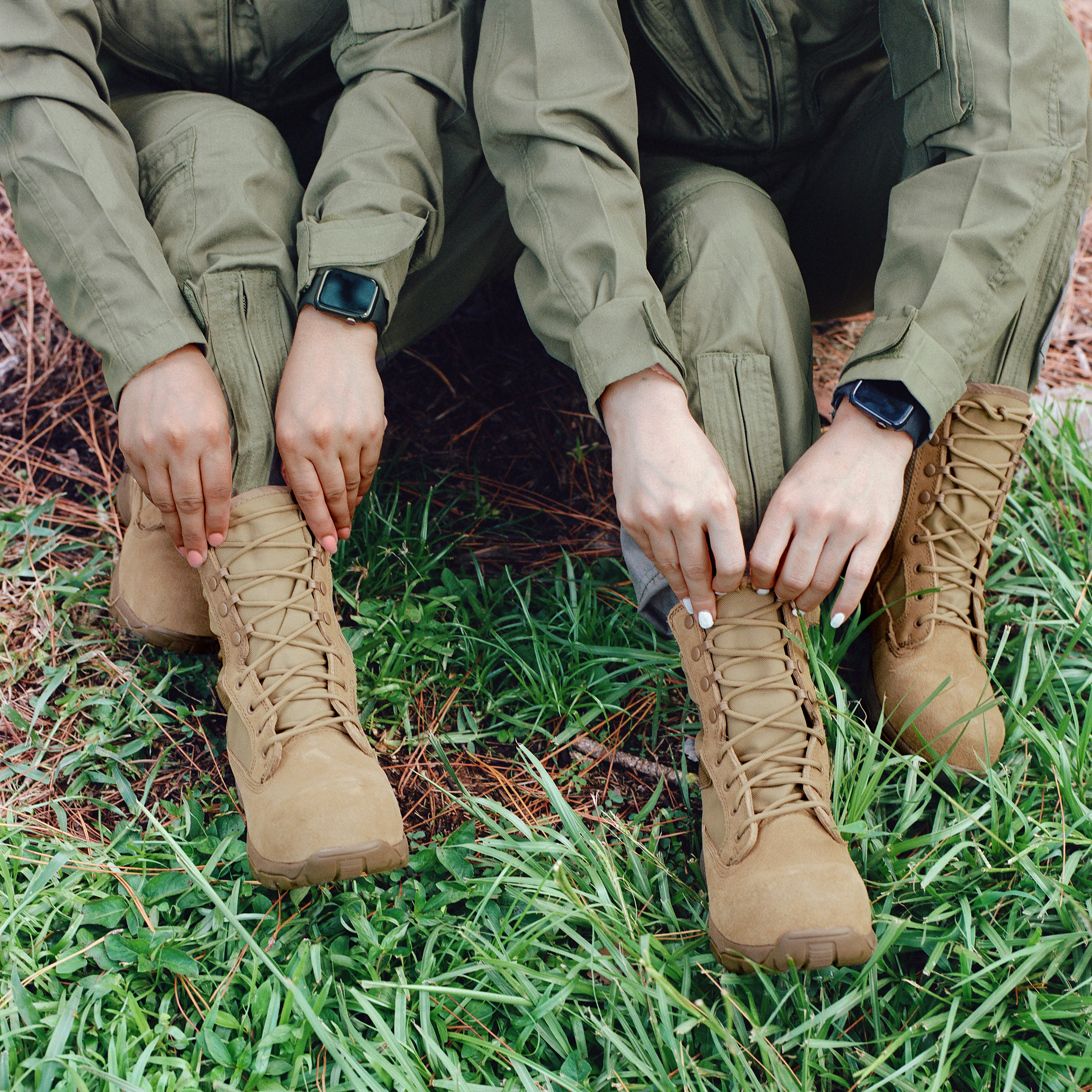
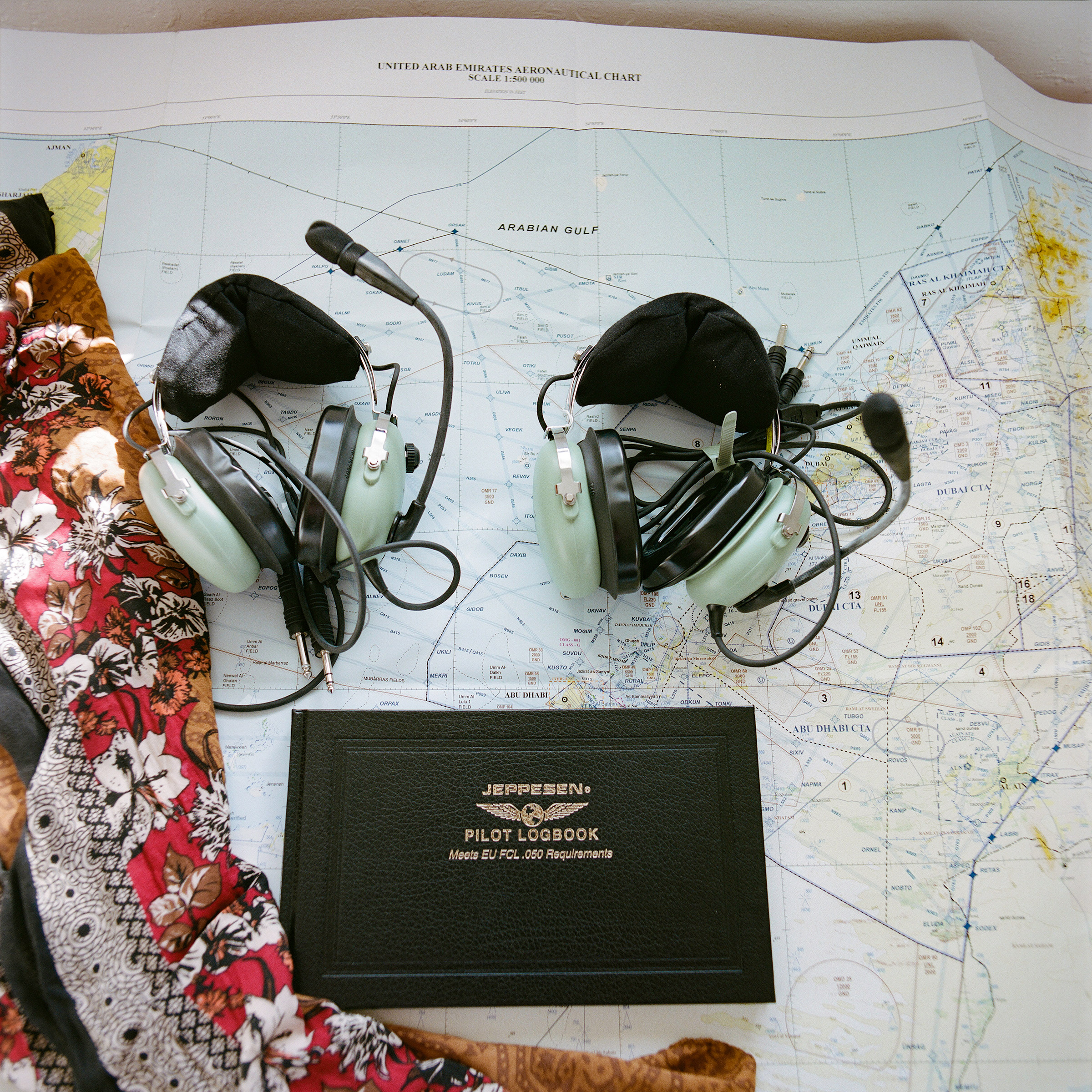
What has surprised you about where you live now?
Najibi: The streets, the people, the food, even the trees—nothing is familiar here.
Rahimi: How far we are from home. In the early days, Hasina and I would look at a map of the world from time to time. We’d look at America, and then Afghanistan, and we’d get a scary feeling of being so far from our home.
When you think of Afghanistan’s future, what comes to mind?
Rahimi: I think about Afghan women, and how they should not be forgotten. They lost everything they had. Their lives, their rights, and their dreams are now being held hostage. Sometimes I feel this situation is not going to last. I think one day Afghanistan will be liberated and we will return to our country. How can a regime that ignores half of society survive?
What’s the most important thing you have with you?
Najibi: I have my air force badge, which is very special to me. The day we flew from Dubai to America, they told us we could only take one suitcase with us. I packed a set of air force uniforms and my flight booklet and a few other things from my time in the military. Once, when I felt homesick, I opened my suitcase. Seeing my uniform gave me the hope that I might be able to study again here and become a pilot. Every time I get tired, I think about that uniform, and I feel like I can handle anything.
Where do you see yourself one year from now?
Najibi: All I dream of is returning to my studies. I hope by this time next year, I’ll be closer to my goal.
Rahimi: I lost my life, but I won’t lose my hope. I am determined to find a way back into my profession. This is the dream that keeps me alive. Even though I sometimes feel exhausted, I tell myself I’ll find a way. Back in Afghanistan my family and even my teachers at times would tell me piloting is not for me. I always felt the discrimination. But I succeeded there. I am sure I can succeed again.
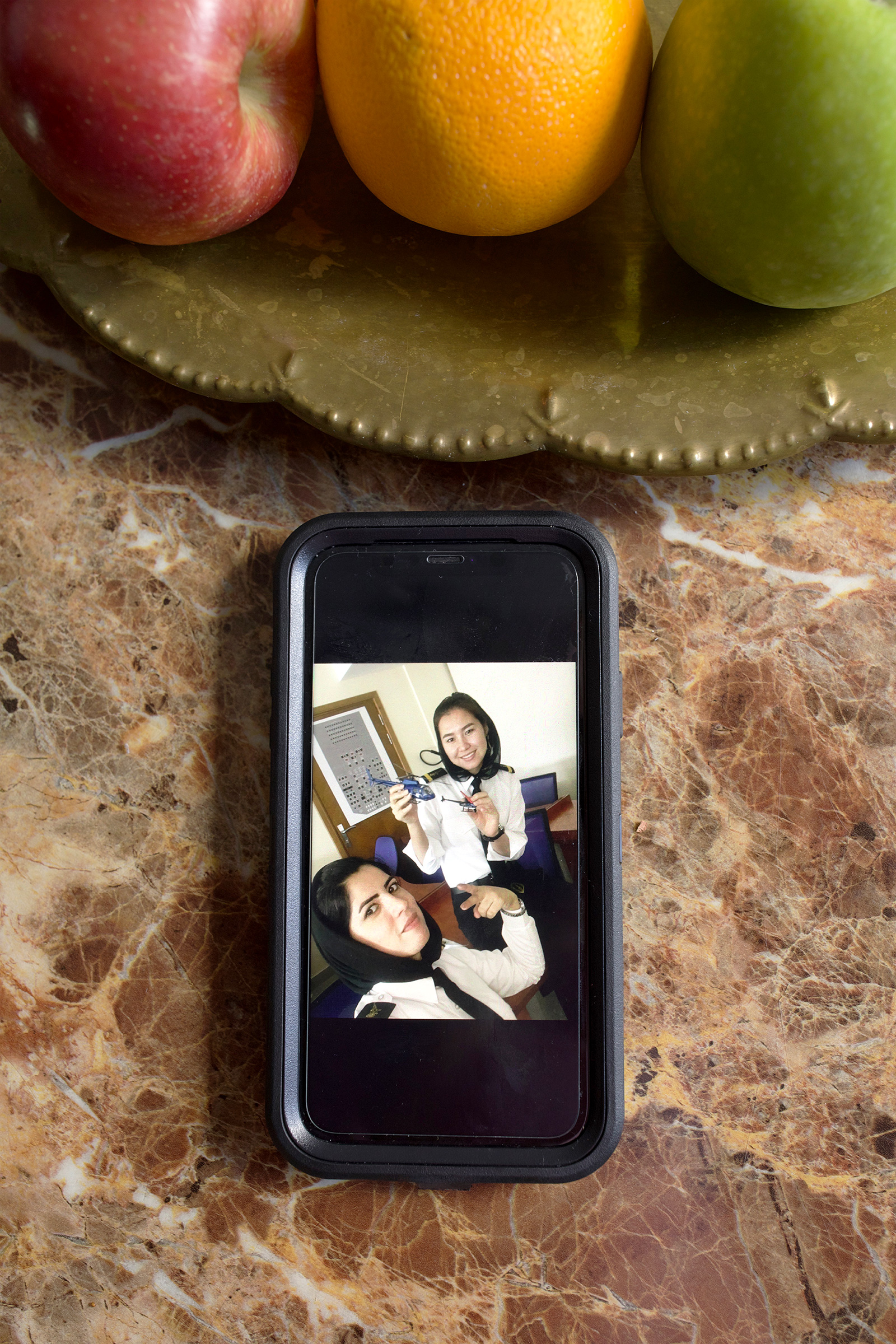
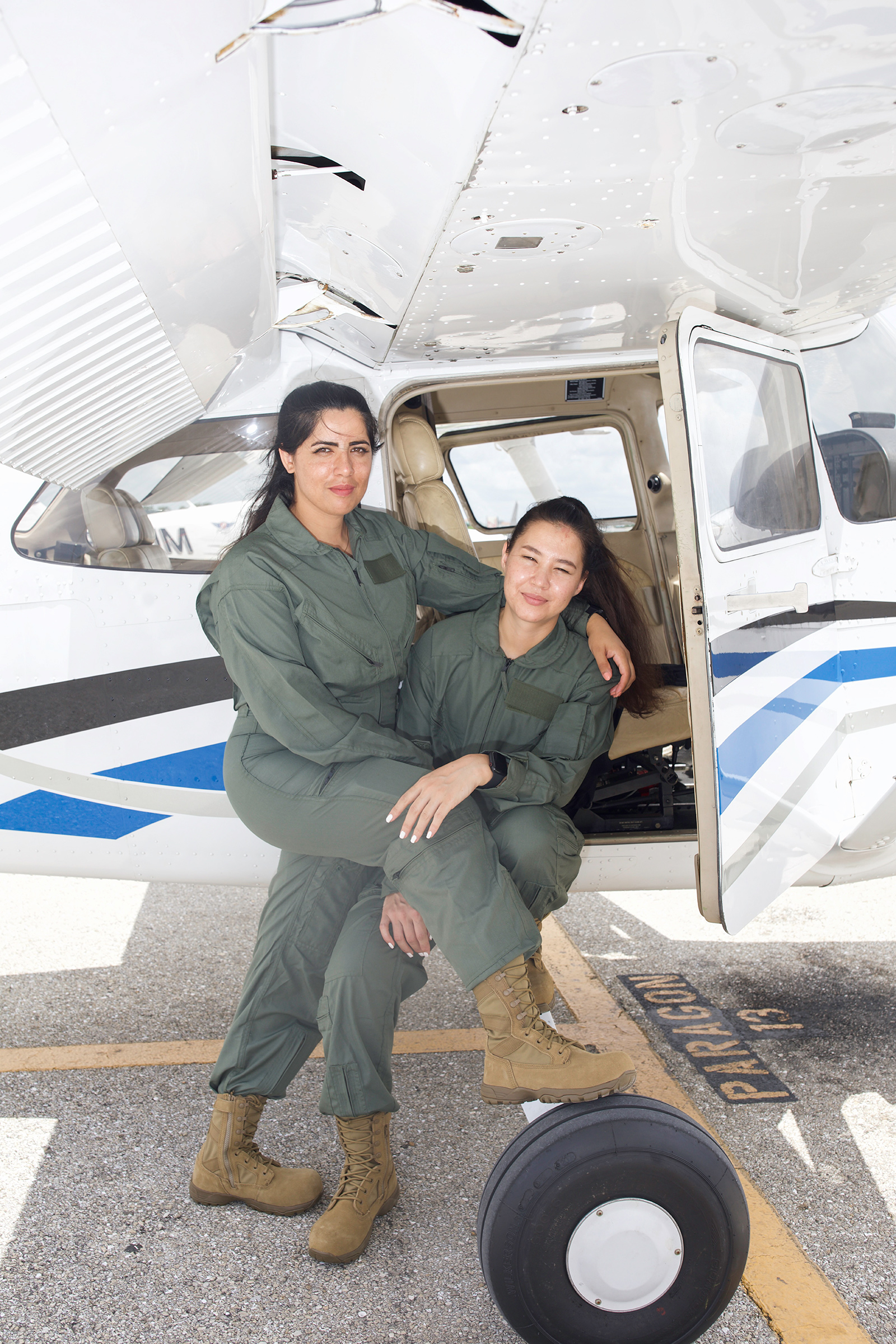
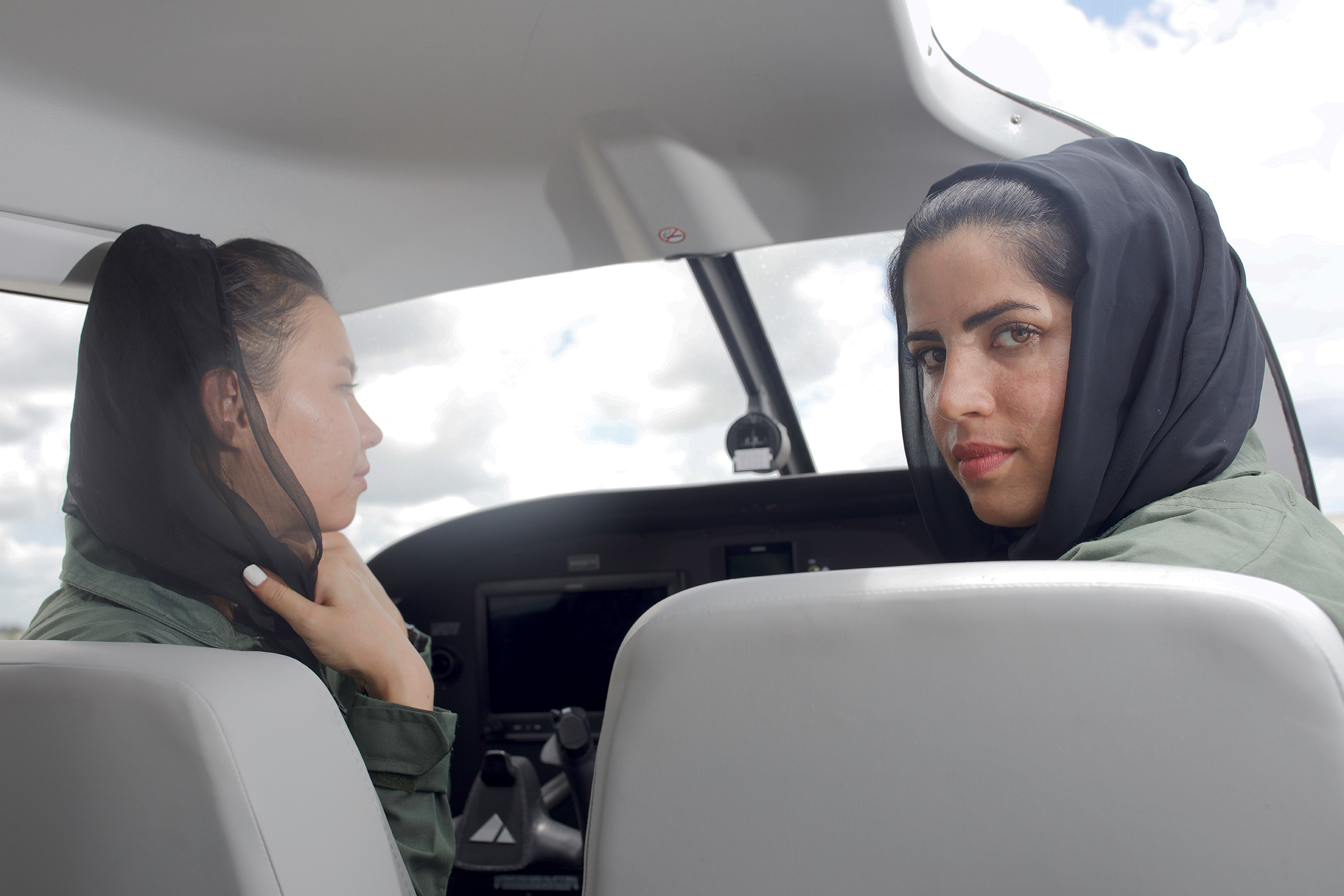
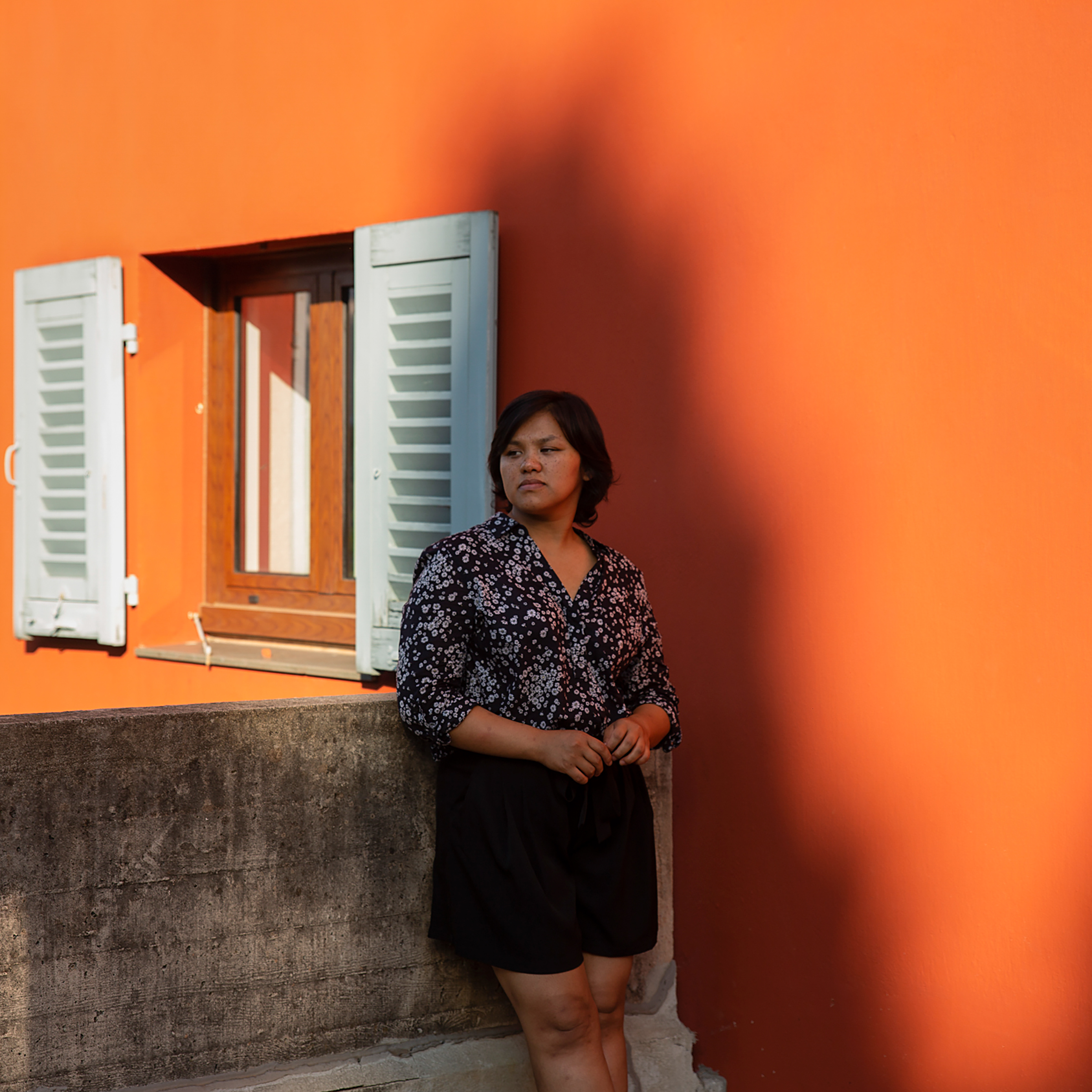
Zahra Khodadadi
Nice, France
Photographs by Fatimah Hossaini for TIME
Photographer Zahra Khodadadi, near the studio where she lives and works, in Nice, France, on July 3, 2022
Zahra Khodadadi
Nice, France
Photographs by Fatimah Hossaini for TIME
For many years, Hazara artist and photographer Zahra Khodadadi, 31, fixed her lens on families in Afghanistan, exploring the ties that bind people together. Now, as fear grips her country under the Taliban, and from her new home in France, she continues to use art to document the violence that is ripping so many loved ones apart.
Leaving Afghanistan was never Khodadadi’s plan. Last summer, as the Taliban’s power surged across the country’s provinces, Khodadadi and her husband, a fellow artist and an activist, felt the danger approaching Kabul. With help from a former colleague in France, the couple secured emergency visas and arrived in Paris on Aug. 12. Three days later, Khodadadi awoke to terrified Facebook messages confirming that the Taliban had captured Kabul. Scared for her family, she worked around the clock to find her parents and four younger siblings a route out of the country. In December, they made it to Canada. Khodadadi doesn’t know when she’ll see them again: she’s had her request for asylum approved, but until she receives her residency papers, she isn’t allowed to leave.
Khodadadi and her husband now live in an art gallery in Nice, part of a project to support artists from all over the globe. On the walls of her studio, she pins photographs of burned-out cars next to news reports describing those who lost their lives. Even from thousands of miles away, she cannot close her eyes to her people’s suffering. She owes it to all Hazara women and persecuted people in Afghanistan, she says, to make sure the rest of the world also sees their pain.
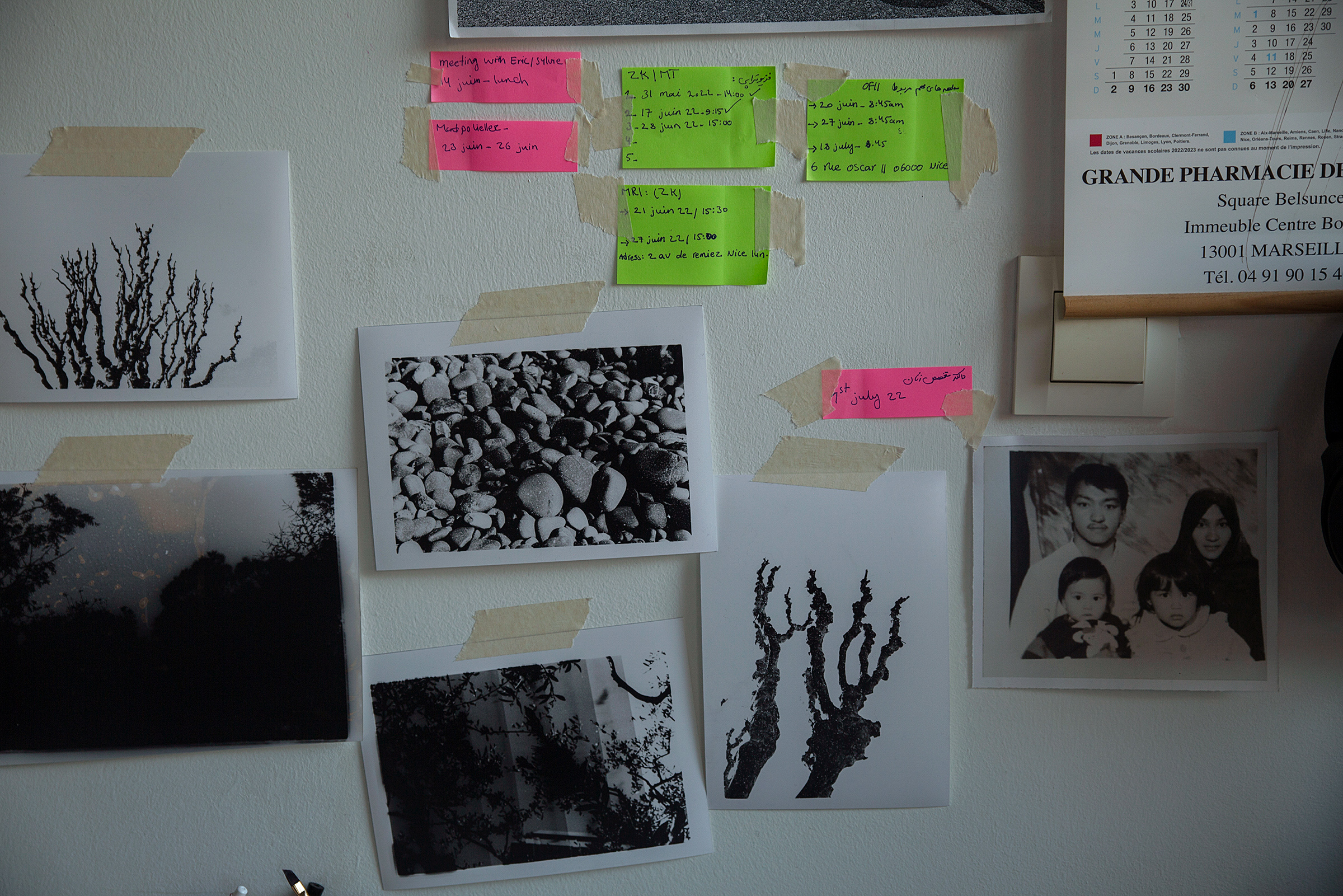
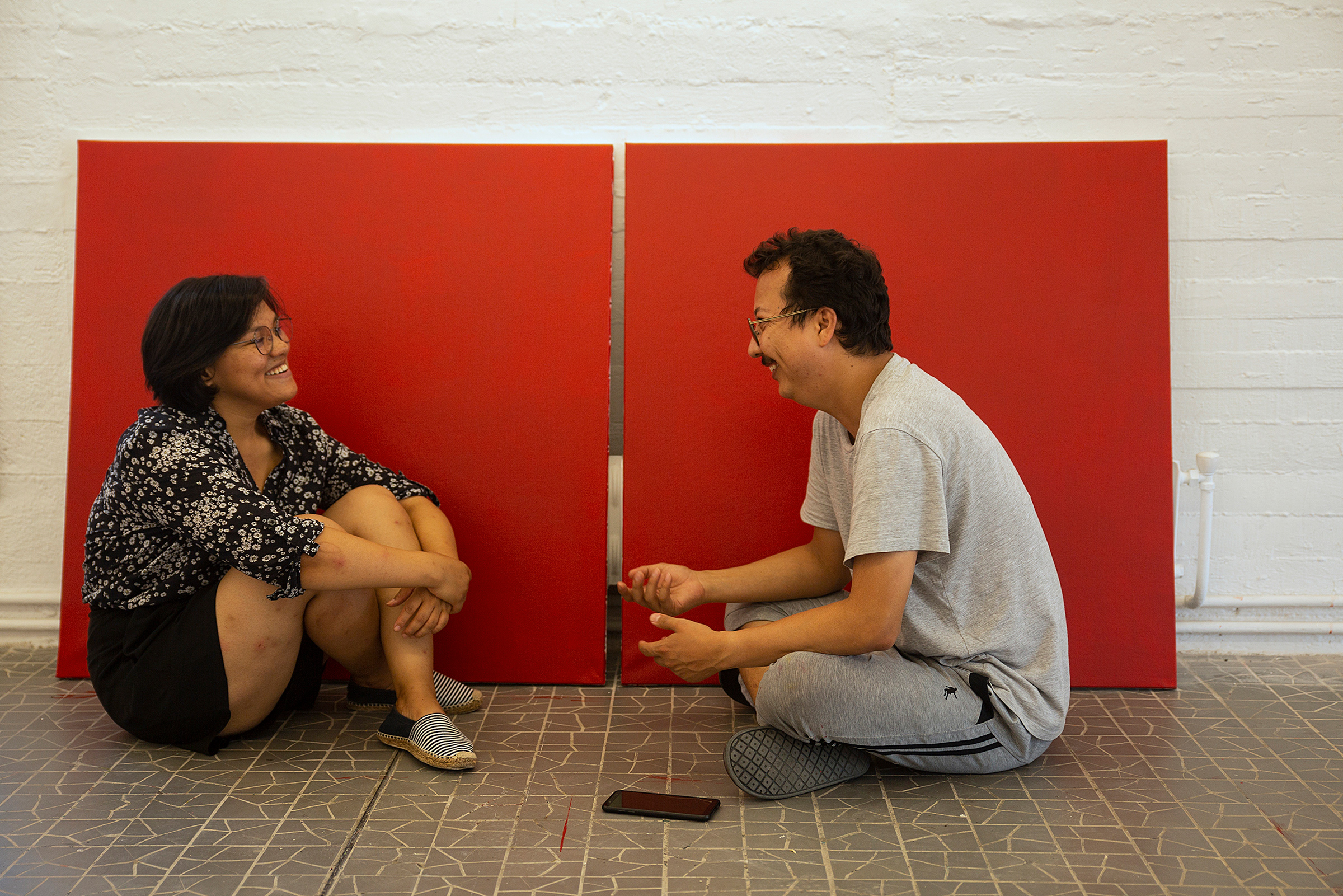
What do you miss most about Afghanistan?
My parents are originally from Bamiyan. It is a very beautiful national park, just three hours’ drive from Kabul. It is so quiet. When you go there, you feel it is kind of healing. You have no fear. I miss that feeling.
When you think of Afghanistan’s future, what comes to mind?
I have no hope for Afghanistan. There is no hope. Nothing.
What food from home do you eat most often?
I cook bolani—it’s a kind of dough, filled with potatoes and vegetables. The difficulty is that it needs lots of time and lots of people to prepare it. I made it here once with my Ukrainian friend—it was so amazing! I rolled out the dough, and she did the filling. It was like a little production line.
Where do you see yourself one year from now?
After all of these experiences, I believe that nothing is certain. I cannot plan anything in my life 100%. I try to do my best, but even short-term plans are very hard. All I know is that I would like to be somewhere peaceful.
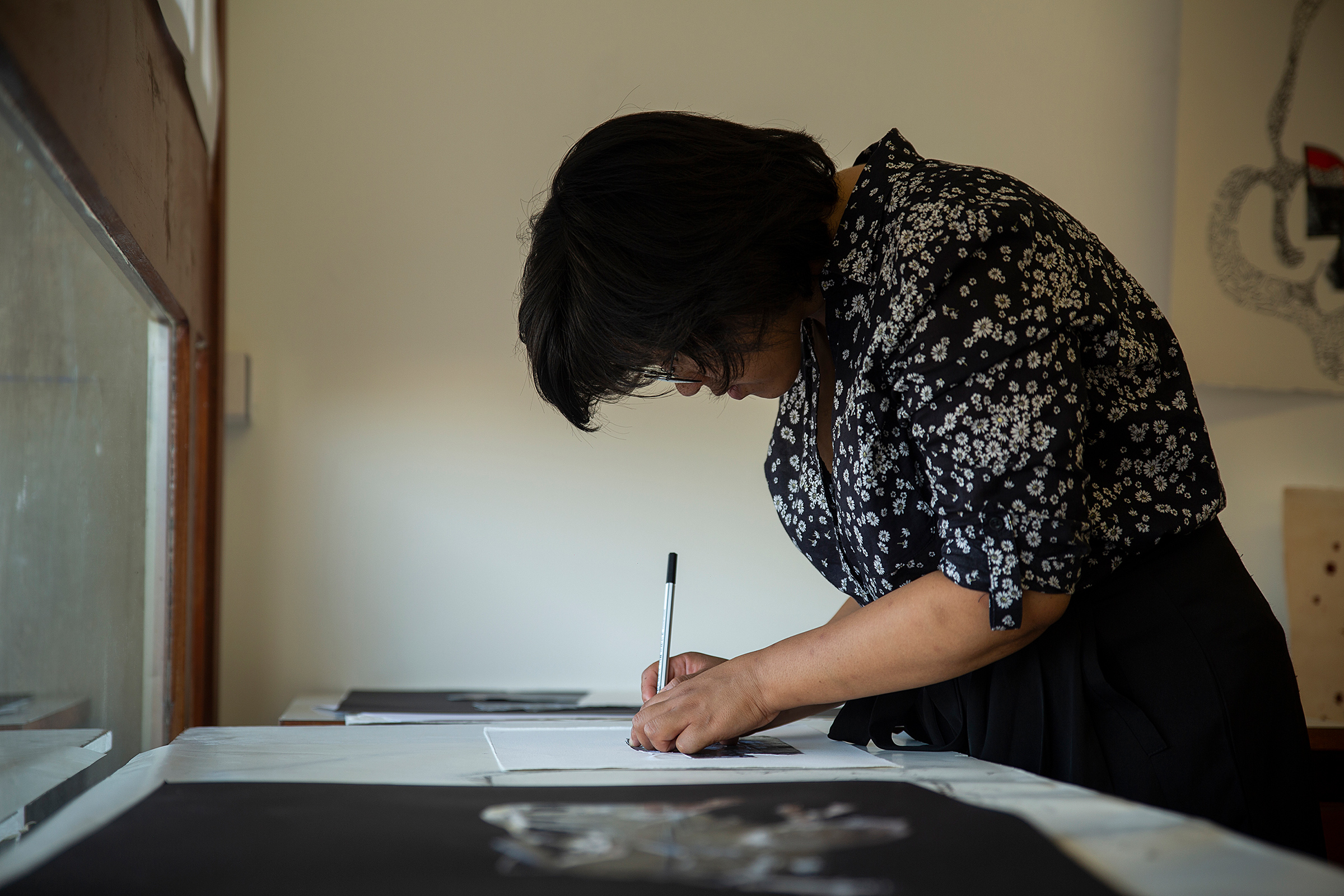
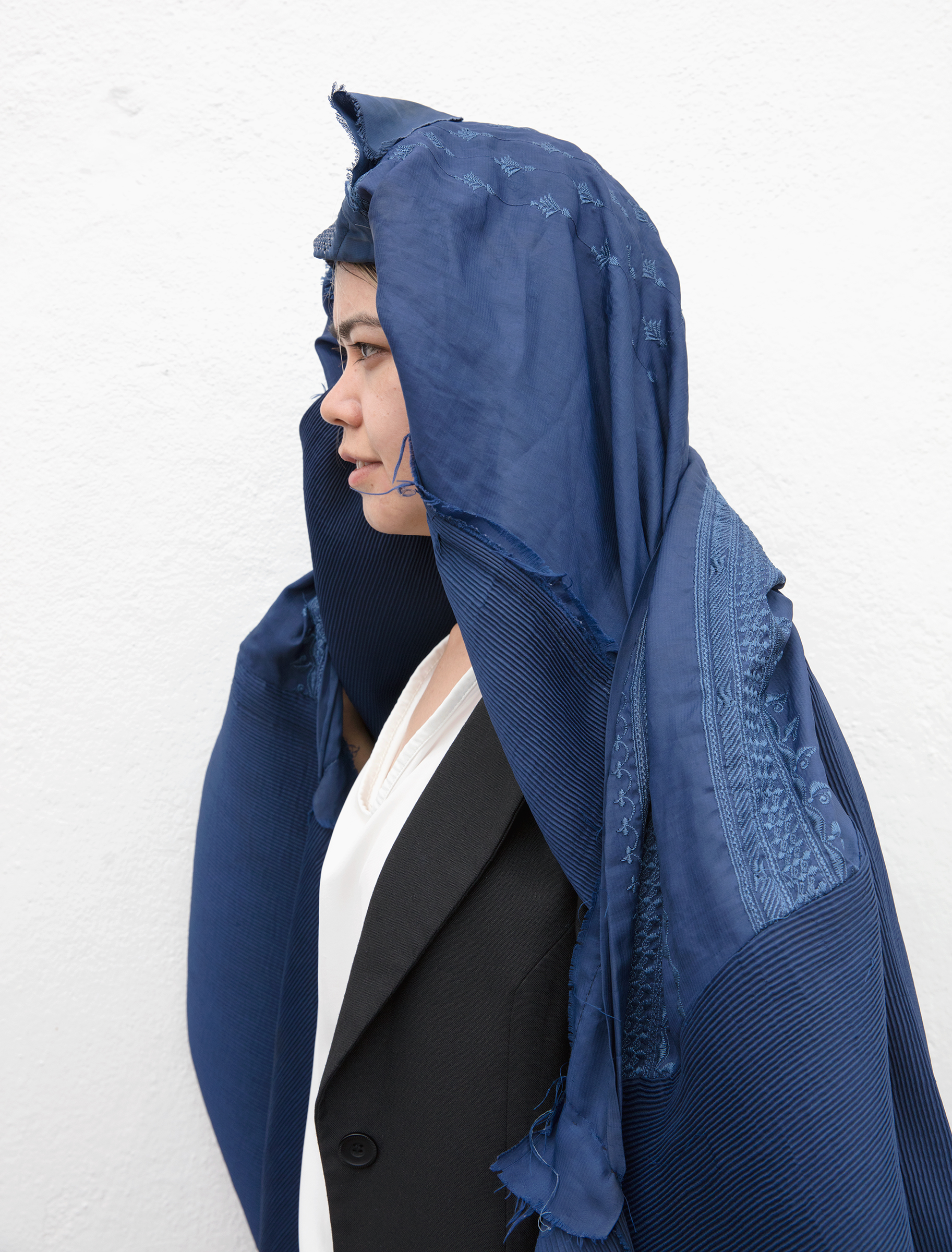
Basira
Dublin
Photographs by Jackie Nickerson for TIME
Basira stands outside her home in Dublin on June 30, 2022
Basira
Dublin
Photographs by Jackie Nickerson for TIME
Basira, a 24-year-old activist campaigning for the rights of the Afghan LGBTQI community, always believed the West had her back. She is too young to remember the Taliban’s previous rule; she was only a toddler when U.S. forces invaded her country.
When the Taliban swept to power last August, she took to the streets of Kabul in protest. She received invitations from several Western nations offering refuge, but she didn’t want to leave the country that had given her so much. “I was sure the international community wouldn’t abandon us,” she says. “But I was wrong.” She soon realized her life was in danger, and hid for two months before leaving for Ireland, concealed in a burqa.
Now living in a small Dublin apartment, she feels isolated and afraid as she grapples with her newfound liberation. Irish Prime Minister Micheal Martin gave her a private audience during Pride Week in June, but Basira spoke on condition that only her first name is used, worried for her family’s safety back home. She is also wary of abuse from fellow Afghans, even in Dublin. From Ireland, she continues to battle for the freedoms of LGBTQI people—both back home and those around the world.
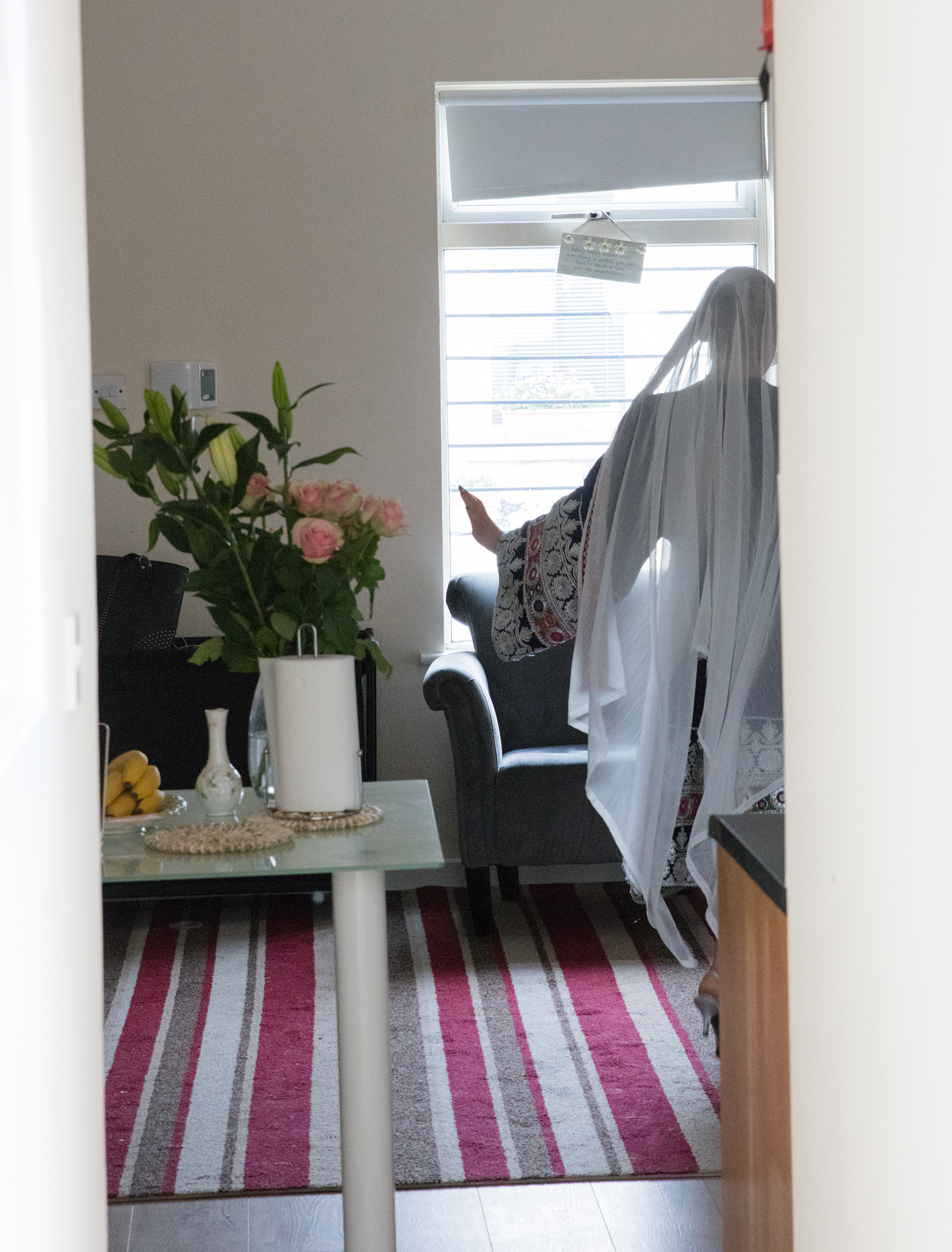
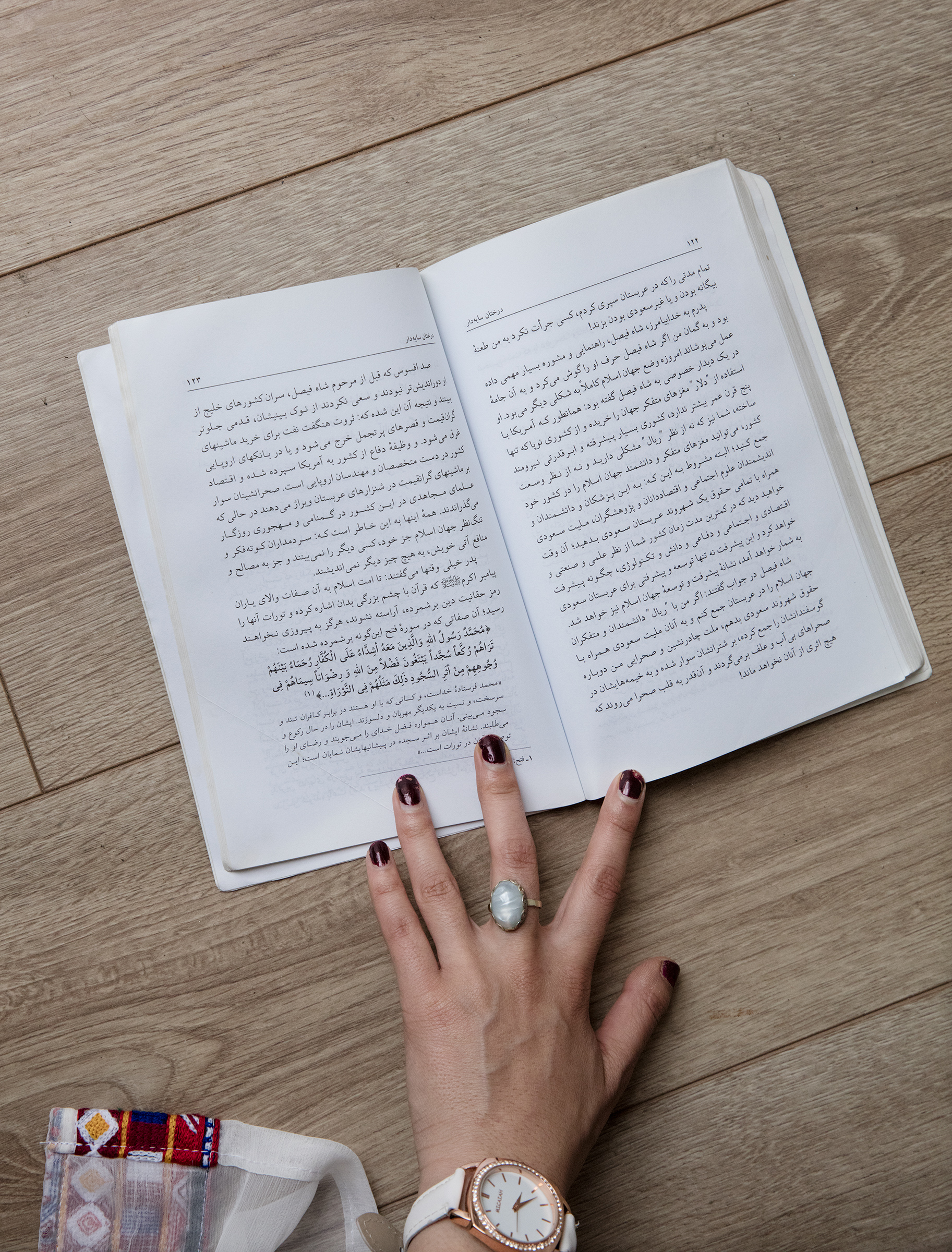
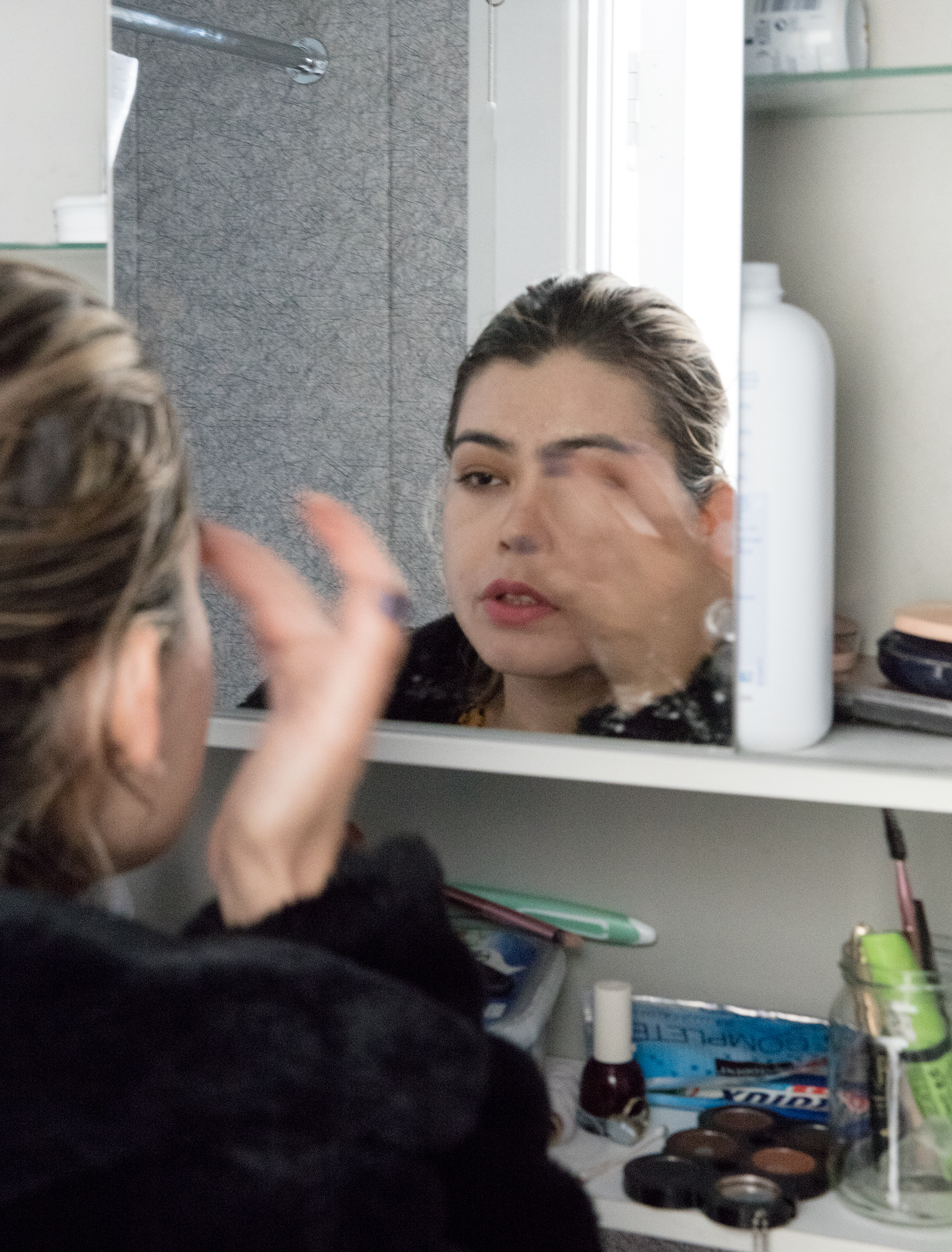
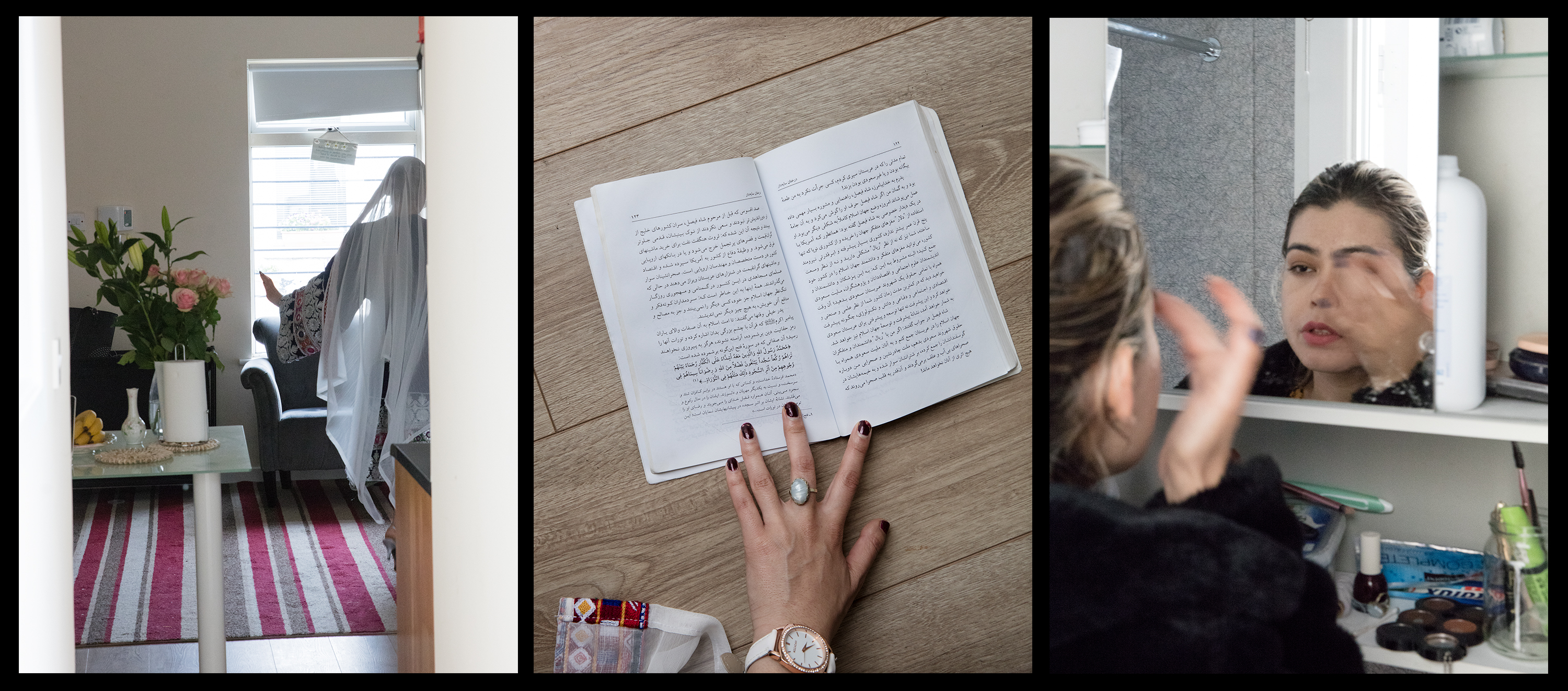
What do you miss most about Afghanistan?
I miss Afghan children, especially my nieces and nephews. After leaving, I dream I am still in Afghanistan. In my dreams I am running, I am protesting; every night I am there. I blame myself sometimes for leaving, for coming here. But then I saw I can work harder and more effectively from outside. I see the girls who are still in Afghanistan, and how they have lost hope. But that hope exists in my heart.
What has surprised you about where you live now?
Ireland is a paradise for the LGBTQI community. We have a lot of LGBTQI people from around the world who are asylum seekers and refugees. They came here to find a peaceful home.
What do you do to relax?
I listen to music, I study, I cook food, I write. I love to put on makeup, because it gives me self-confidence.
When you think of Afghanistan’s future, what comes to mind?
Afghanistan will absolutely get worse and worse. Afghanistan is also suffering a lot from climate change, from earthquakes and floods. No support is coming, so poverty is increasing day by day.
What food from home do you eat most often?
I cook Kabuli pilau. Luckily there are a lot of Asian shops here, so I can find the right ingredients and spices.
What is the most treasured thing you brought with you?
My skills are the most important things I brought with me from Afghanistan. My university diploma is also very special to me. I brought it in a folder in my suitcase.
What word do you associate with the Taliban?
Terror.
Where do you see yourself in one year?
I want to continue raising the voice of Afghan women, as well as the LGBTQI community back home, through our organization Afghan LGBT.
Choose one word to describe yourself.
I call myself the sultan. I prefer to be a leader than a boss. That’s why I am a sultan. Since I was little, I have been the only one looking after me. My life has been my empire. I made it all.
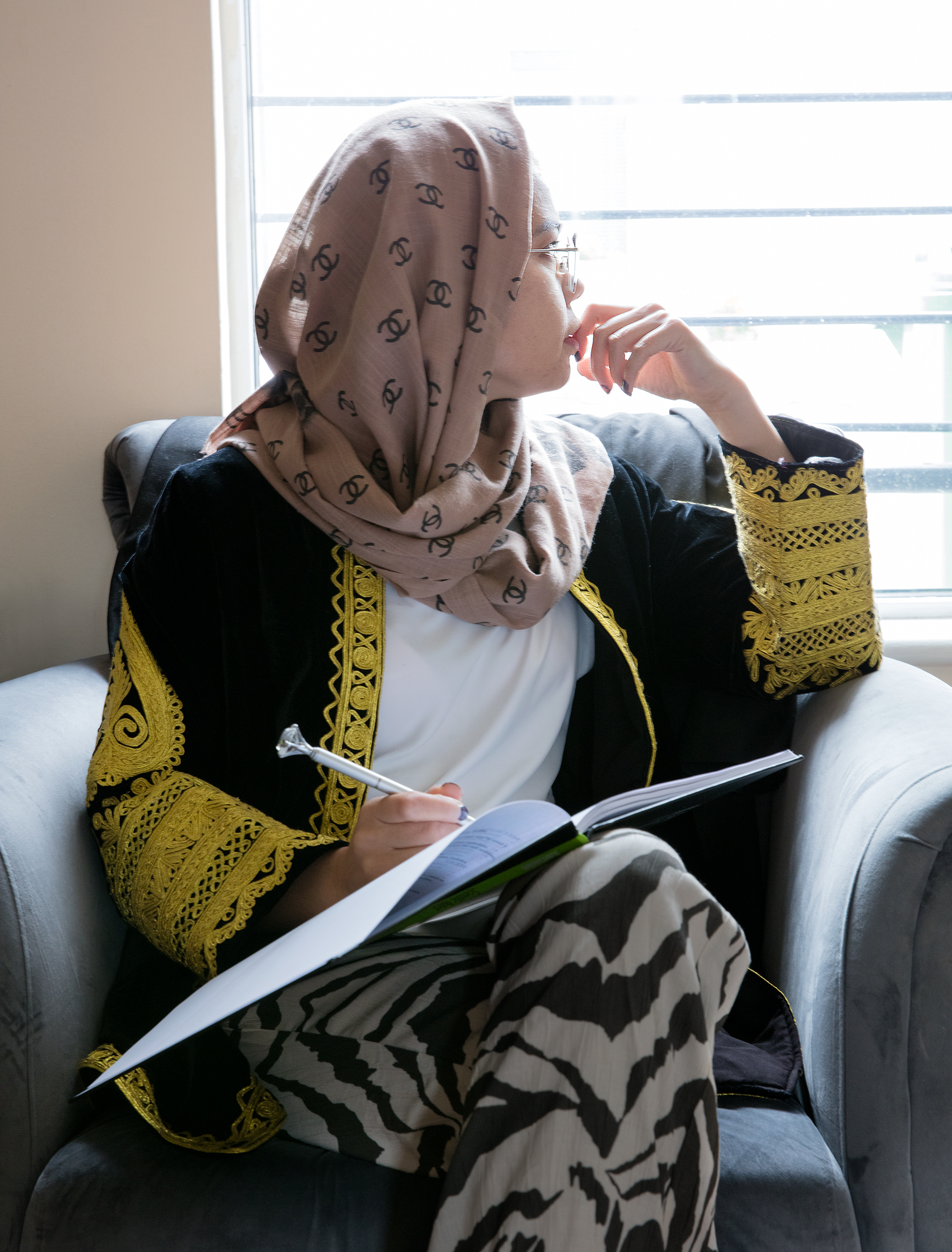
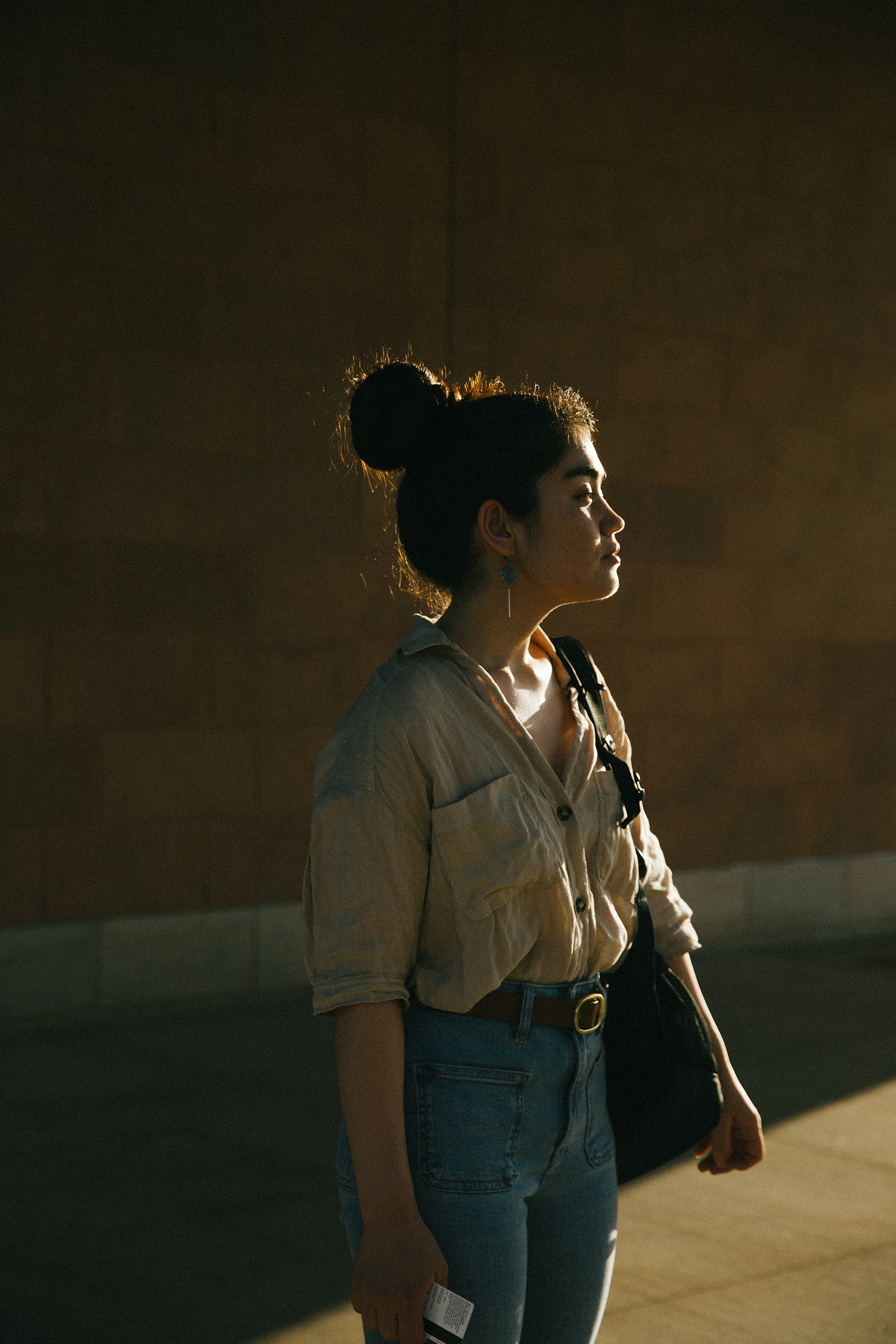
Masouma Tajik
New Brunswick, N.J.
Photographs by Diana Markosian for TIME
Masouma Tajik, photographed at the Rutgers University campus, on July 7, 2022.
Masouma Tajik
New Brunswick, N.J.
Photographs by Diana Markosian for TIME
Masouma Tajik dreams of buying her own place. One year ago, having graduated from the American University of Afghanistan, she was working as a data analyst in Kabul. She would return each evening to the rented apartment she had decorated with fairy lights and candles, cook a meal and watch a movie. Her favorite was Django Unchained. She felt at home.
Tajik, 23, has since spent months in limbo. “I lived in places that no human being should live,” she says. Last August, after days spent in the Kabul airport—where she was whipped by the Taliban—she was finally able to board a plane for Kyiv. There, she did freelance coding jobs, began to make friends, and applied to study abroad. As the breadwinner for her family—her degree and fluency in English have opened doors that remain closed to her parents—Tajik sent money back to Afghanistan every month.
In mid-February, worried about an impending Russian invasion, Tajik packed her backpack once more and fled to the Western city of Lviv. Her journey took her to Warsaw, to a refugee camp in the Netherlands, and ultimately to the U.S.—after being accepted with a full scholarship into a two-year master’s program in data science at Rutgers University.
Since she arrived on May 28, she has tried to adjust to yet another new home, this time a shared dorm. She is going to therapy, jogging, and cooking, which she describes as a kind of meditation.
She is aware that not many people got the chance to get out of Afghanistan, let alone to have the education she has had. And though she doesn’t know what will happen after two years, she knows she won’t let these opportunities come to nothing.
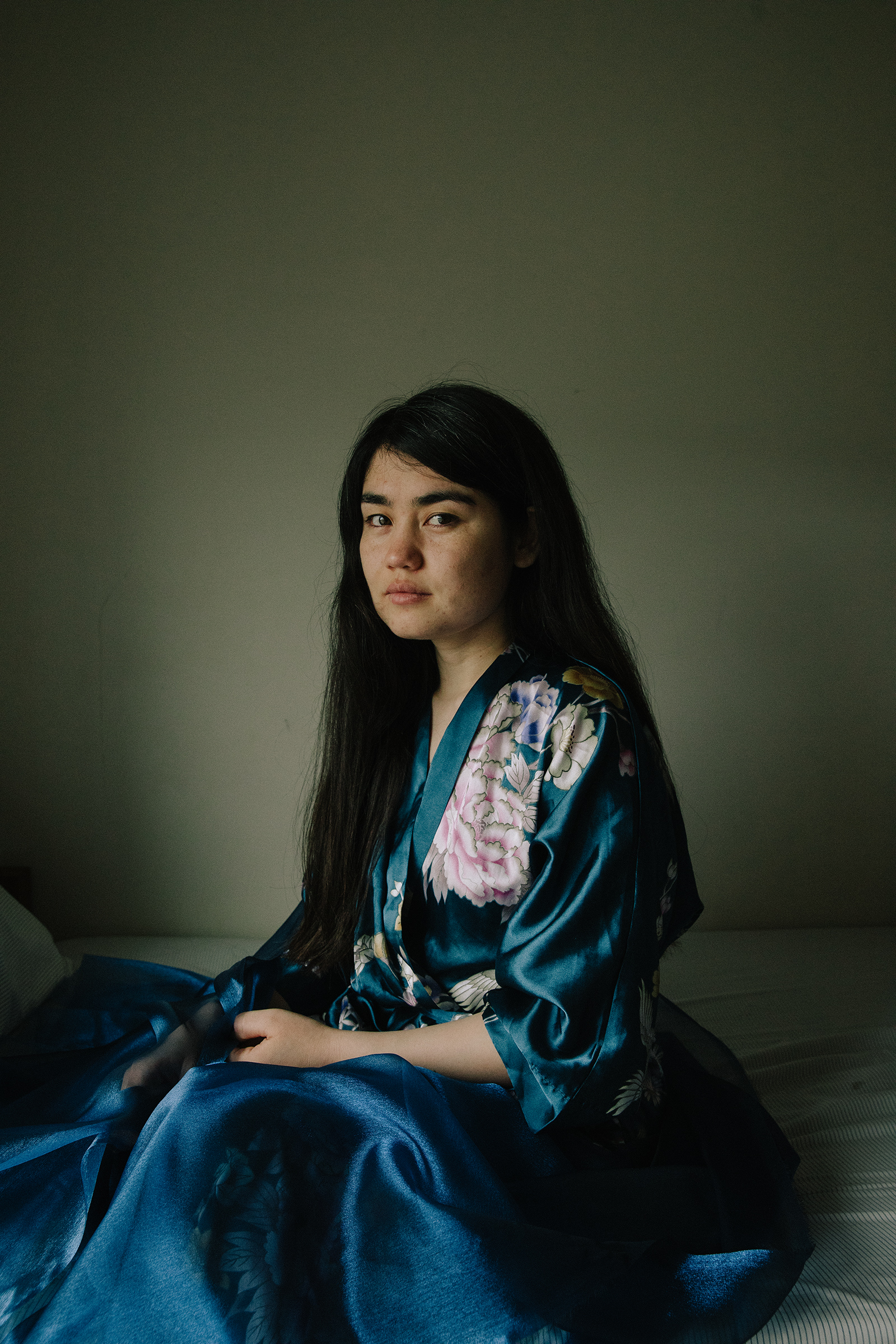
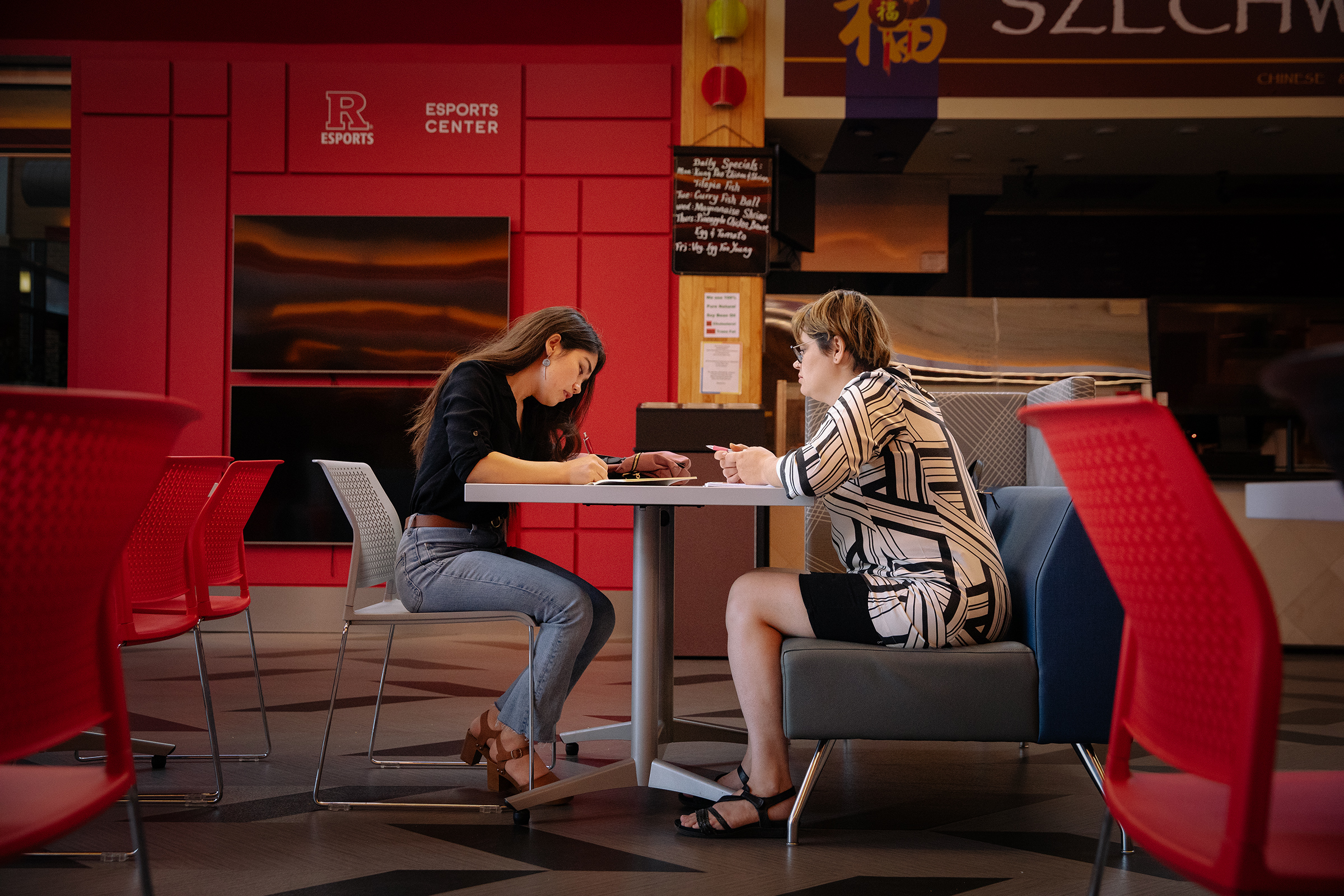
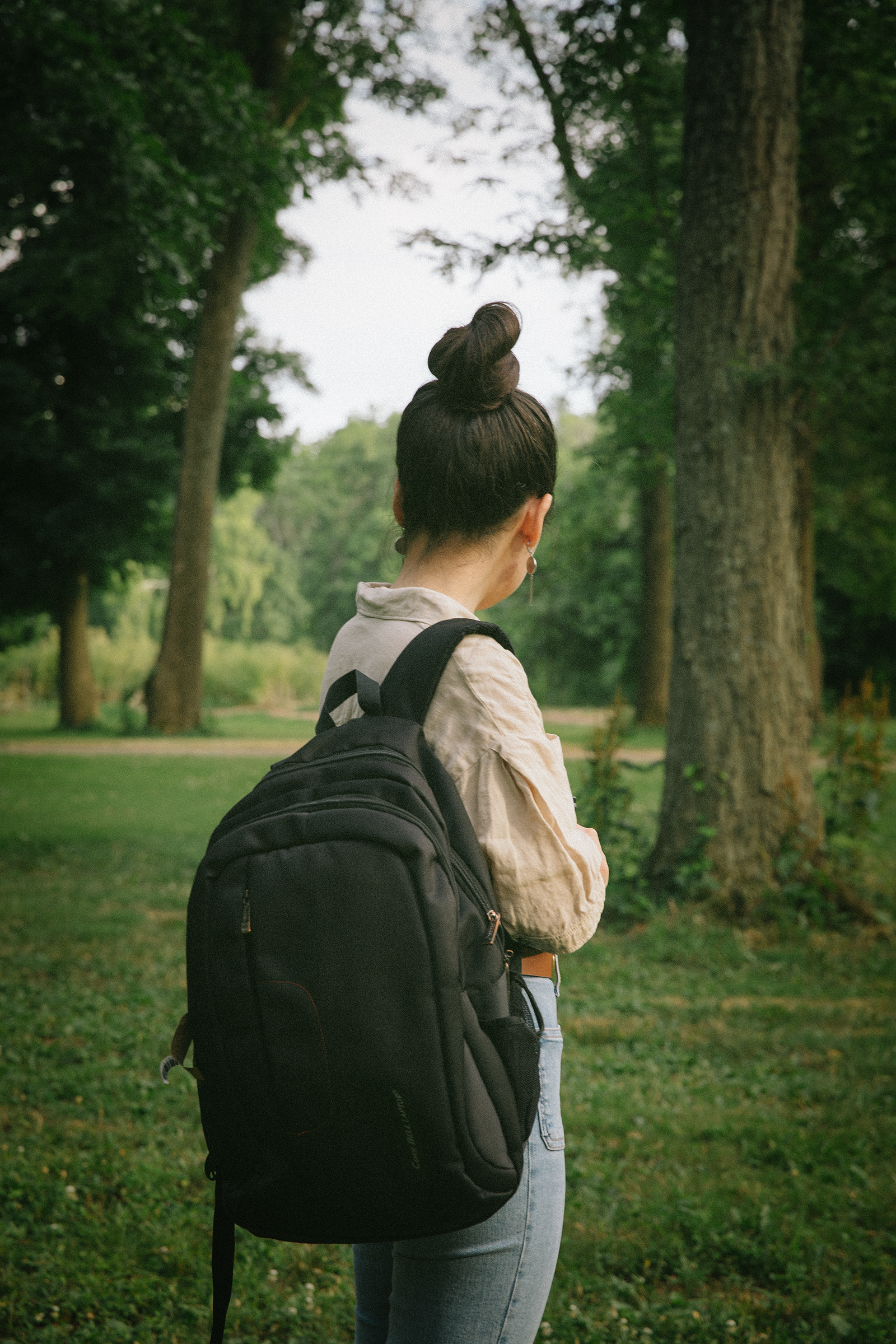
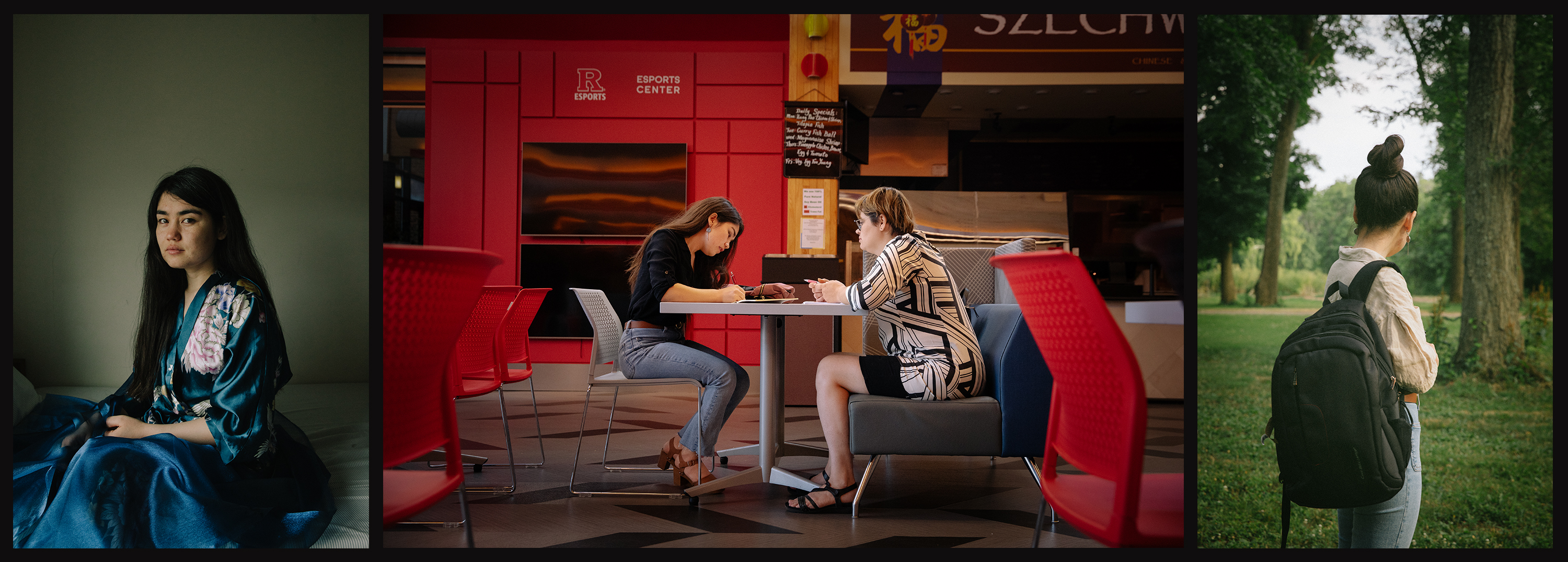
What do you miss most about Afghanistan?
I miss going to the office every day. I miss the ice cream shop in Kabul. That glimpse of normalcy that I had in Kabul, I miss that.
What has surprised you about where you live now?
Making friends in the West is really difficult. Afghans are really chatty, really warmhearted; even before becoming friends, they offer tea and then they start conversations. Here, I think that from a certain age or from a certain time, you cannot actually make good, permanent friends.
What’s the most treasured possession you have with you?
I left nearly everything in Kabul, I just had a backpack with my laptop and a novel by Elif Shafak, The Forty Rules of Love. That was almost like a Koran for me, but I gifted it to a Ukrainian friend.
I left Kyiv in a hurry too for Lviv. Now my favorite possessions are the Ukrainian earrings and necklace that I bought myself on my birthday in Lviv. It was on Feb. 23, and I was celebrating alone. I didn’t know anyone, but I was having a good time because Lviv is a very beautiful city. And then the next morning I woke up to the sounds of sirens.
What do you wish for Afghanistan?
Afghans are not pathetic. We are being held back by the regulations, these unnecessary, complicated processes, our lives on pause because we’re in refugee camps and cannot study or work. It shouldn’t be like this. What we need is not pity and empathy. What we need is opportunities so we can make our own way.
Choose one word to describe yourself.
Unstoppable.
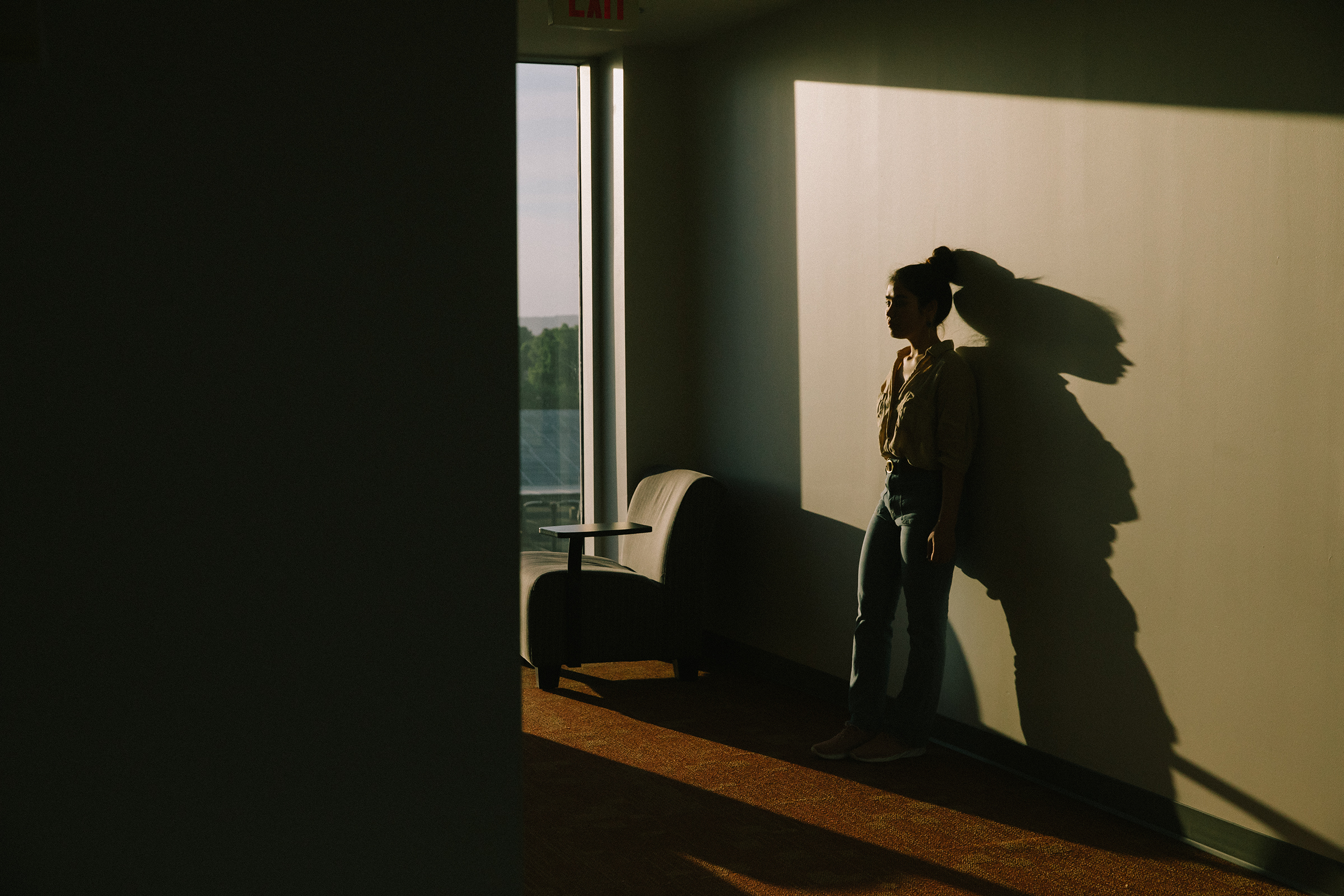
- PROJECT LEADERS: NAINA BAJEKAL, AMIE FERRIS-ROTMAN AND ZAHRA JOYA
- PHOTO EDITORS: SANGSUK SYLVIA KANG, PAUL MOAKLEY, AND KATHERINE POMERANTZ
- DIGITAL DEVELOPMENT & DESIGN: TIMOTHY BOOSER, AUDREY CLARK, AND KAREN WERLING
- PRINT DESIGN: VICTOR WILLIAMS AND D.W. PINE
- EDITORS: KELLY CONNIFF, SAM JACOBS, LILY ROTHMAN AND KARL VICK
- AUDIENCE EDITORS: SAMANTHA COONEY, ANNABEL GUTTERMAN, ALEX HINNANT, SOO JIN KIM, CAROLINE OLNEY, KITTY RUSKIN, KARI SONDE, AND KIMBERLY TAL
- COPY EDITORS: HELEN EISENBACH, MARK HOKODA, AND JENNIFER SCHIAVONE
- FACT-CHECKERS: ANISHA KOHLI AND JULIA ZORTHIAN